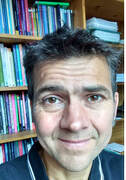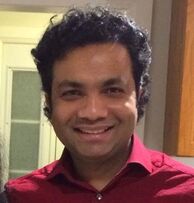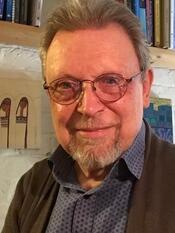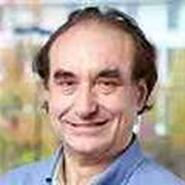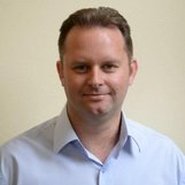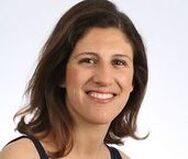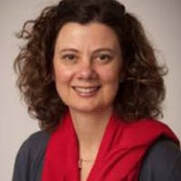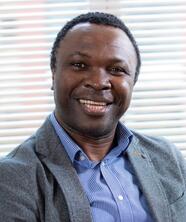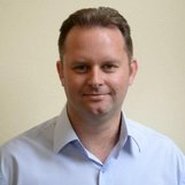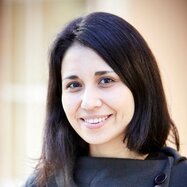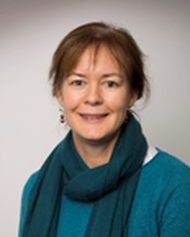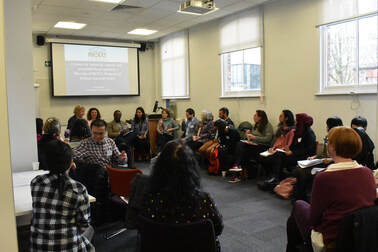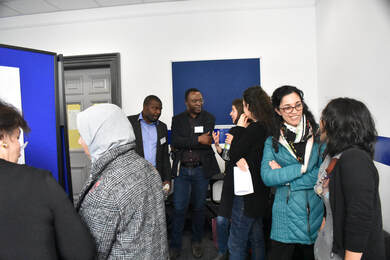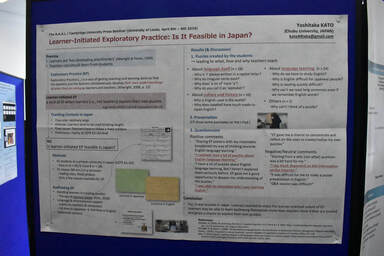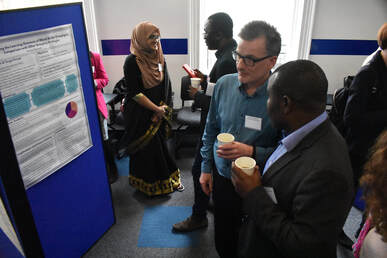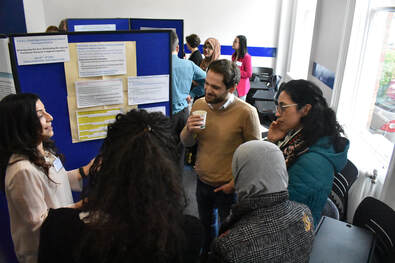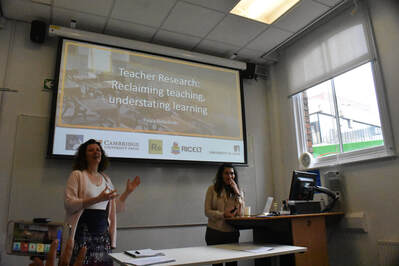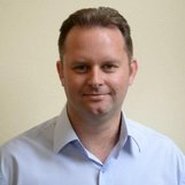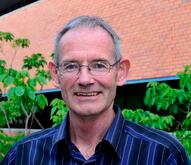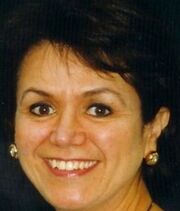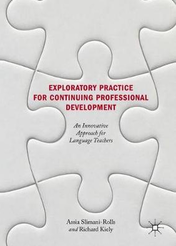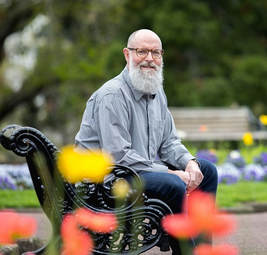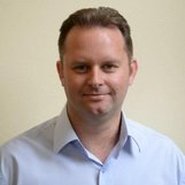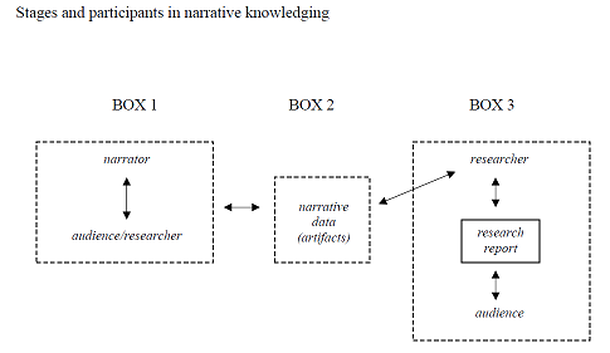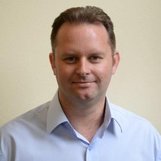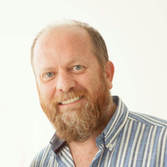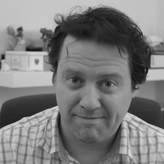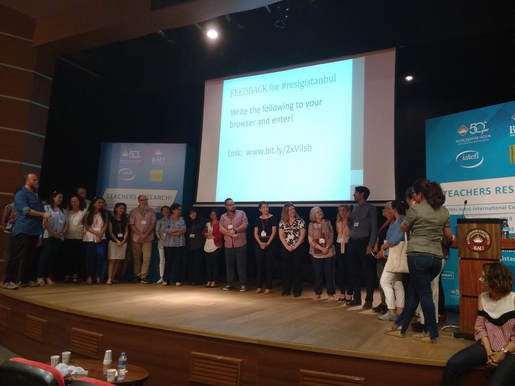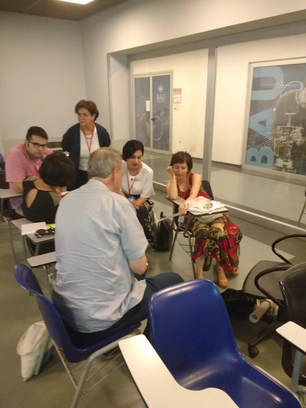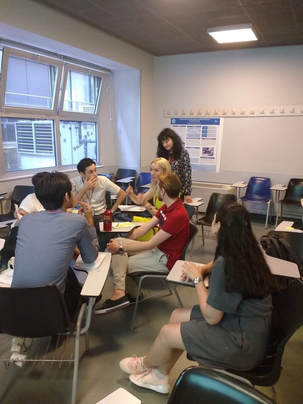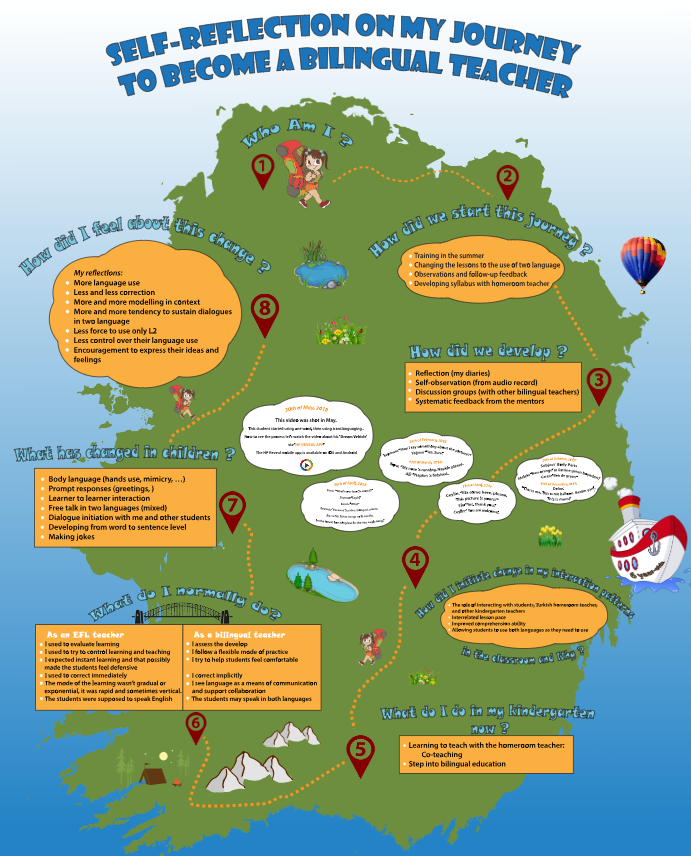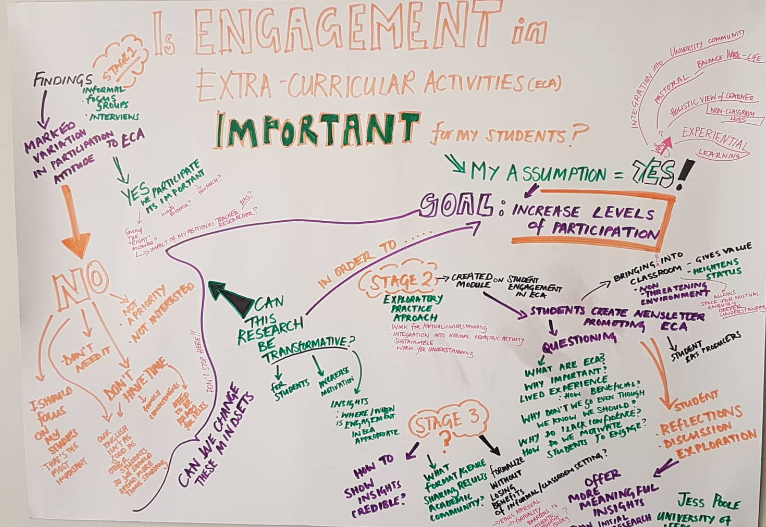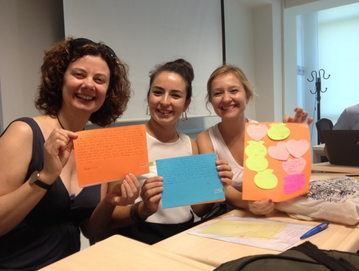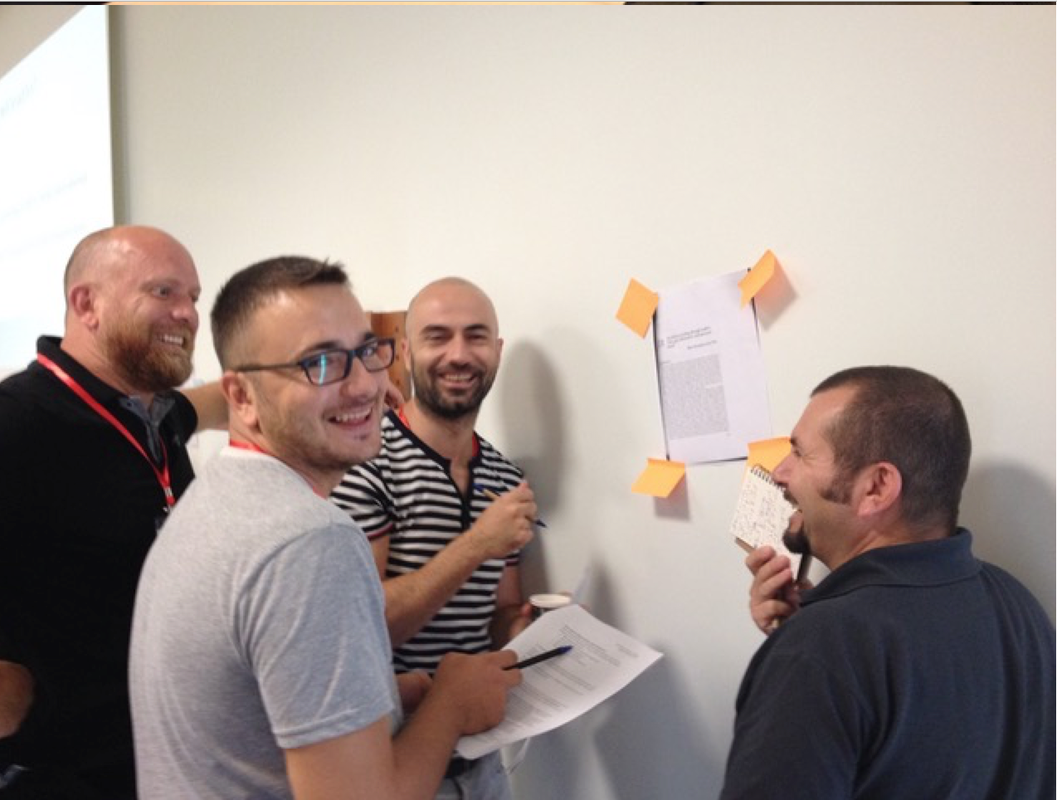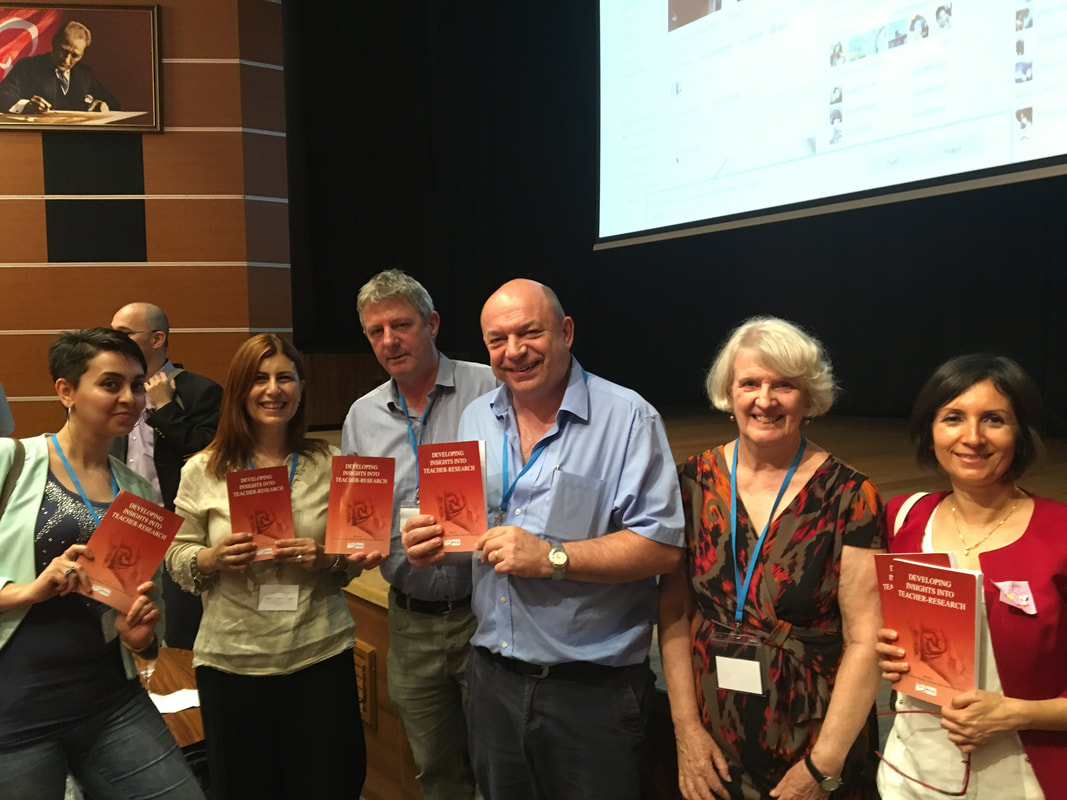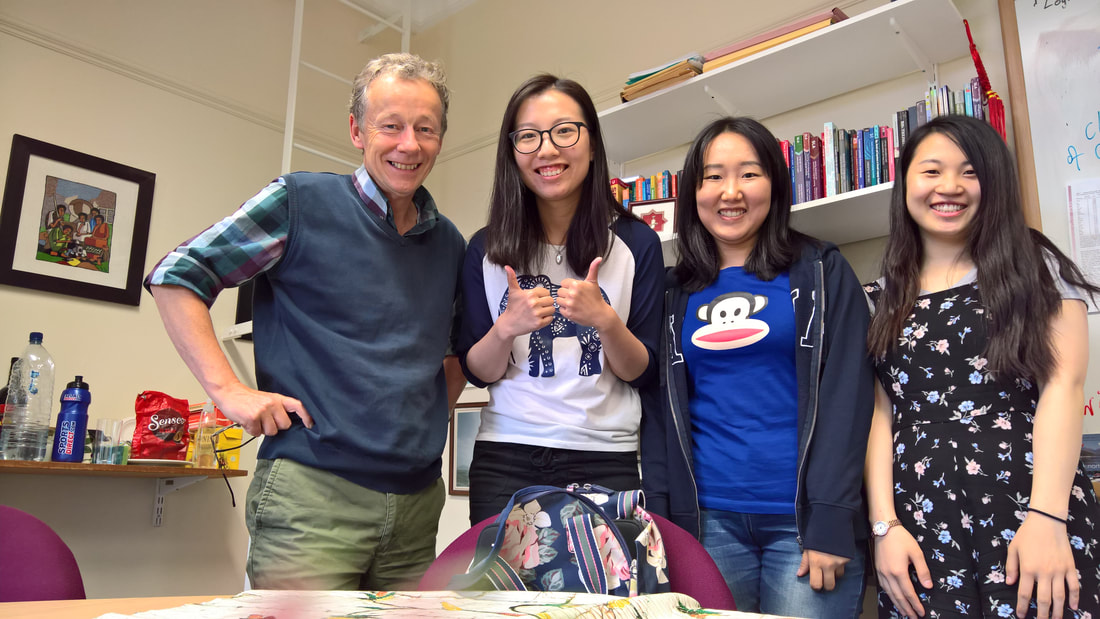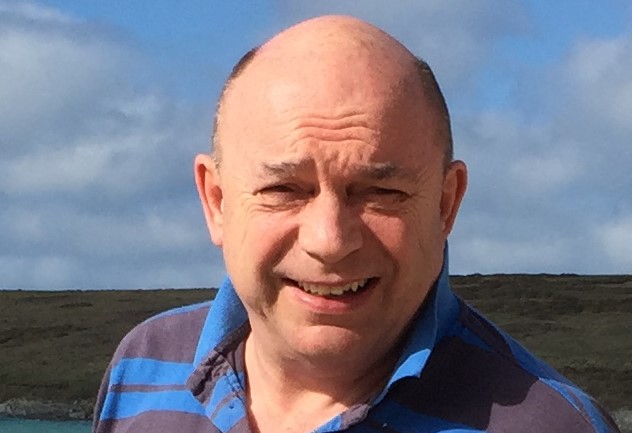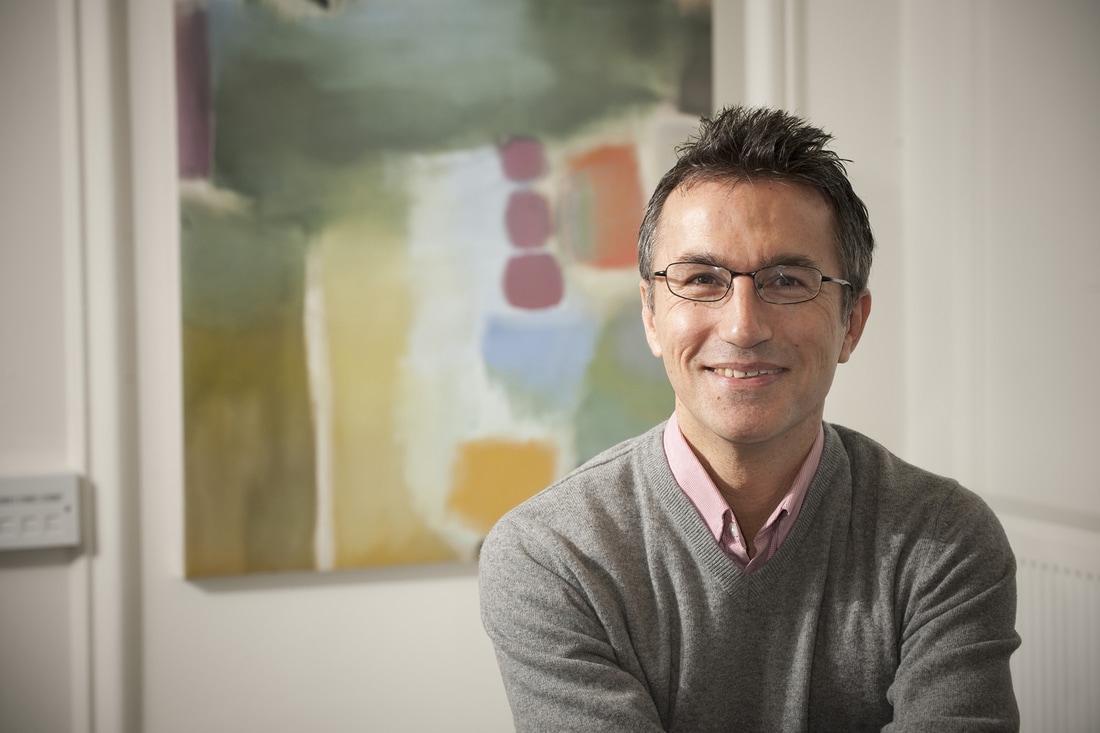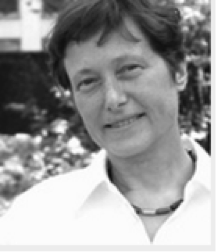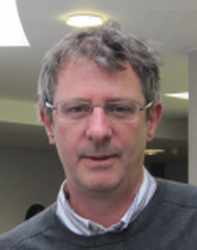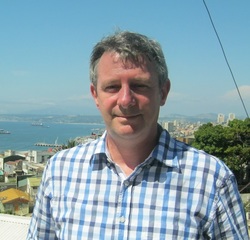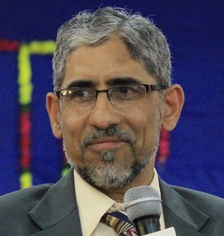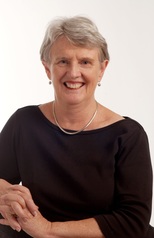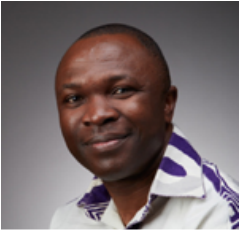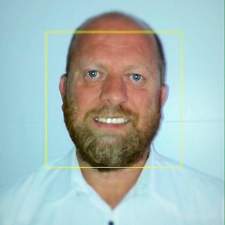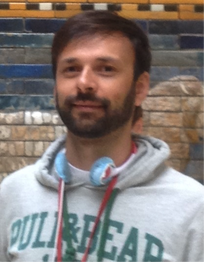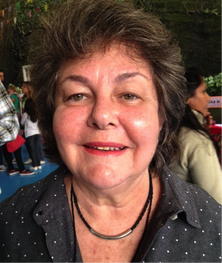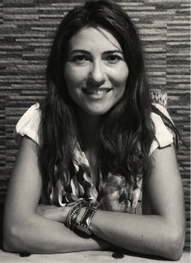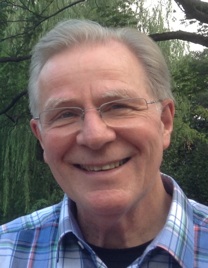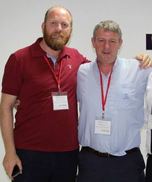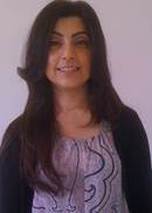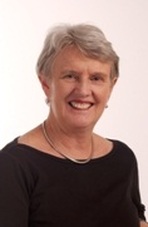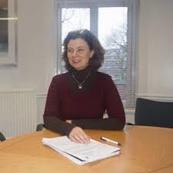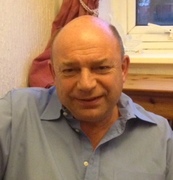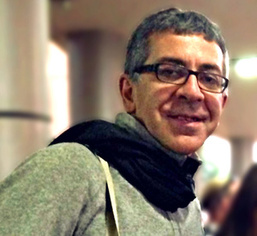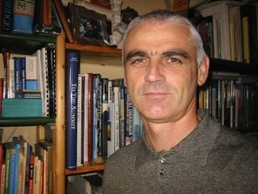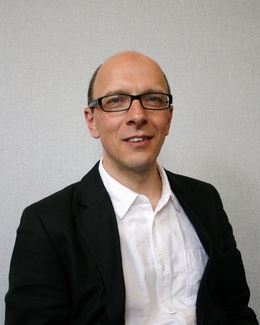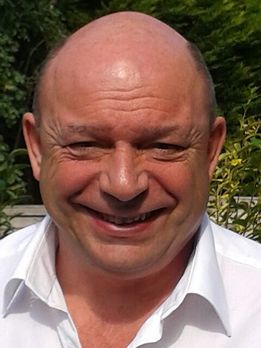Online discussions
The IATEFL Research Special Interest Group aims to be inclusive and encourage a diversity of views and we are keen for members and non-members alike to participate in the online discussions that we host. Please don't hesitate to get involved as the aim of the discussion is to interact and develop understanding.
To join the Research SIG's Google Group, which is open to members and non-members of the SIG alike, just click on the link and follow the instructions. It is important to do this if you wish to get regular updates and contribute to discussions yourselves. It's very easy to join the Google Group and doesn't cost anything.
Please do invite anyone you know who might also be interested in joining the Google Group and engaging in discussions. The forthcoming one should be of interest to teachers all around the world. So please do sign up.
For more details or enquiries please get in touch with Graham Hall, ReSIG’s online discussion moderator, [email protected]
Please do invite anyone you know who might also be interested in joining the Google Group and engaging in discussions. The forthcoming one should be of interest to teachers all around the world. So please do sign up.
For more details or enquiries please get in touch with Graham Hall, ReSIG’s online discussion moderator, [email protected]
ReSIG Online Discussion 18-29 January, 2021
'(How) do teachers read research, why, and (how) does it help them/us in the classroom ... and beyond?'
Moderator
|
GRAHAM HALL. Having previously taught English in a number of countries, Graham is Professor in Applied Linguistics/TESOL at Northumbria University, UK. He is author of Exploring English Language Teaching: Language in action (2011; 2nd edition 2017) which was winner of the 2012 British Association for Applied Linguistics (BAAL) book prize, and editor of The Routledge Handbook of English Language Teaching (2016). He was editor of ELT Journal from 2013-17. His own research interests focus on language teaching methodology and, more specifically, the use of the learners’ own language in the support of language learning; classroom discourse and interaction; the experiences of school students studying through English as an Additional Language; and teacher research.
|
When: Monday 18th - Friday 29th January 2021
What: (How) do teachers read research, why, and (how) does it help them/us in the classroom ... and beyond?
To what extent do teacher read or engage with research about English language teaching and learning? What facilitates or supports their engagement with 'the literature', and what barriers to access exist? What might be done to further support teachers reading and use of research in their professional lives? Or, as some suggest, is the research-pedagogy divide unbridgeable?
Where: IATEFL Research SIG Discussion List. If you are not yet a member of the list, visit http://resig.weebly.com/online-discussions.html and follow the links to join.
How: Read the freely available articles on this topic in advance - if you have time! It's not compulsory; links will be circulated closer to the time. Then, simply log in to the chat, reflect on a series of discussion prompts, share your views and respond to others. What's happening with teachers and published research at the moment, how might people be further supported in their reading ... and to what extent is this valuable?
The article available for reading in advance is:
Sato, M. and Loewen, S. (2019) ‘Do teachers care about research? The research-pedagogy dialogue’ ELT Journal 73/1. 1-10. Available online at: https://academic.oup.com/eltj/article/73/1/1/5168114?searchresult=1
Graham Hall
What: (How) do teachers read research, why, and (how) does it help them/us in the classroom ... and beyond?
To what extent do teacher read or engage with research about English language teaching and learning? What facilitates or supports their engagement with 'the literature', and what barriers to access exist? What might be done to further support teachers reading and use of research in their professional lives? Or, as some suggest, is the research-pedagogy divide unbridgeable?
Where: IATEFL Research SIG Discussion List. If you are not yet a member of the list, visit http://resig.weebly.com/online-discussions.html and follow the links to join.
How: Read the freely available articles on this topic in advance - if you have time! It's not compulsory; links will be circulated closer to the time. Then, simply log in to the chat, reflect on a series of discussion prompts, share your views and respond to others. What's happening with teachers and published research at the moment, how might people be further supported in their reading ... and to what extent is this valuable?
The article available for reading in advance is:
Sato, M. and Loewen, S. (2019) ‘Do teachers care about research? The research-pedagogy dialogue’ ELT Journal 73/1. 1-10. Available online at: https://academic.oup.com/eltj/article/73/1/1/5168114?searchresult=1
Graham Hall
ReSIG Online Discussion 17-29 February, 2020
"Knowledge Mobilization in Applied Linguistics & ELT"
This first discussion of the new year (and new decade!) centres around the concept of Knowledge Mobilization in relation to ELT and Applied Linguistics and Dr Sardar Anwaruddin's recent work in this area.
A preview of Sardar's 2019 book is available by clicking on this link:https://brill.com/view/title/39527 and selected extracts and key concepts are presented below, forming the basis of the first phase of our exciting upcoming discussion.
A preview of Sardar's 2019 book is available by clicking on this link:https://brill.com/view/title/39527 and selected extracts and key concepts are presented below, forming the basis of the first phase of our exciting upcoming discussion.
Moderator
|
Sardar Anwaruddin is an Assistant Professor in the Department of Languages, Literatures and Linguistics at York University in Canada. Previously he taught English for Academic Purposes (EAP) at BRAC University and North South University in Bangladesh. His current research interests are writing pedagogy, knowledge mobilization, teacher education, and affect theory. His articles have appeared in journals such as Educational Philosophy and Theory, Professional Development in Education, Discourse, Reflective Practice, Teaching in Higher Education, Educational Studies, Curriculum Inquiry, International Journal of Leadership in Education, International Journal of Research and Method in Education, and Oxford Review of Education. Correspondence: [email protected]
|
Knowledge mobilization refers to “the reciprocal and complementary flow and uptake of research knowledge between researchers, knowledge brokers and knowledge users—both within and beyond academia—in such a way that may benefit users and create positive impacts….”
Definition of Knowledge Mobilization proposed by the Social Sciences and Humanities Research Council of Canada. Retrieved from
https://www.sshrc-crsh.gc.ca/funding-financement/programs-programmes/definitions-eng.aspx#km-mc
“The concept of knowledge mobilization is particularly relevant to the field of applied linguistics because the field itself was built on the premise of application. The foundational goal of applied linguistics was to apply linguistic knowledge to real-world language-related problems. As Kaplan and Widdowson (1992) wrote, ‘Applied is a technology which makes abstract ideas and research findings accessible and relevant to the real world; it mediates between theory and practice’ (p. 76).”
Excerpt from Anwaruddin, S. M. (Ed.). (2019). Knowledge mobilization in TESOL: Connecting research and practice. Leiden: Brill. https://doi.org/10.1163/9789004392472
One way of making research-based knowledge “relevant to the real world” is to apply it to pedagogical practice. However, a growing body of research suggests that applying research-based knowledge to pedagogy is a complex and difficult task. Based on anecdotal experience and work with ESL/EAP teachers, I would like to ask the following questions as a way of understanding knowledge mobilization in Applied Linguistics and English Language Teaching (ELT):
Phase One - Feb 17th-23th 2020:
1. What kinds of barrier do teachers encounter while attempting to mobilize research-based knowledge in their teaching?
2. How do cultural and institutional contexts influence teachers’ agency of knowledge mobilization?
3. How should teachers interpret research findings?
Phase Two - Feb 24th-29th 2020:
1. As social actors, how can teachers transform research-based knowledge into a capacity to act?
2. How does the geographical location of the teacher affect their ability to access and utilize research-based knowledge?
3. How does knowledge get entangled with power and interest?
4. Should research-based knowledge be prioritized over other forms of knowledge?
ReSIG Online Discussion - November 4 - November 15, 2019
"Researching the Intercultural: Intersubjectivity and the Problem with Postpositivism"
This exciting new discussion centres around Prof Adrian Holiday and Dr Malcolm MacDonald’s recent article which appeared in the May 2019 edition of Applied Linguistics journal. The article will be freely available during October and November by clicking on this link: https://doi.org/10.1093/applin/amz006
Authors
|
Professor Adrian Holliday is Professor of Applied Linguistics and Intercultural Education at Canterbury Christ Church University, where he supervises doctoral research in the critical sociology of English language education and intercultural studies. He taught and developed materials in technical English at the British Council in Iran in the 1970s. In the 1980s he was a founder of Higher Languages Institute at Damascus University, specialising in English for science and medicine, and was then involved in a national university curriculum project located at Ain Shams University, Cairo. He has written about appropriate methodology, native-speakerism, qualitative research methods and intercultural communication. More details can be found at adrianholliday.com.
|
|
Dr Malcolm N. MacDonald is a researcher, editor and supervisor currently based at the University of Warwick. His principal research interests are: intercultural communication, particularly cultural translation and intercultural ethics; and discourse analysis, particularly medical discourse and the discourse of security. He is a founding member and committee member of the International Association of Language and Intercultural Communication (IALIC), and editor of the SCI listed journal Language and Intercultural Communication(LAIC), published by Taylor and Francis. After teaching EAP and ESP in Rep. Seychelles, Kuwait and Singapore, Malcolm has taught modules in applied linguistics, discourse analysis and intercultural communication at undergraduate and postgraduate level at the Universities of Stirling, St Andrews and Exeter. Malcolm has published extensively in journals such as Pedagogy, Culture and Society and Discourse and Society. With Duncan Hunter, he has recently published The Discourse of Security: Language, Illiberalism and Governmentality with Palgrave MacMillan.
|
Moderators
|
Chris Banister is Senior Lecturer in English for Academic Purposes in the Institute of Languages and Culture at Regent’s University London. In his current role, Chris teaches business and academic English across the university and on the business foundation programme. Previously, Chris worked in wide ranging ELT contexts in both London and Istanbul, Turkey. He holds an MA in TESOL from the UCL Institute of Education, where he conducted research into vocabulary lists for academic and business English. Chris is a keen practitioner researcher and has conducted Exploratory Practice inquiry into obtaining learner feedback and peer teaching of vocabulary, areas on which he has recently published articles and chapters in edited volumes.
|
|
Dr Ana Inés Salvi is Lecturer in Education (TESOL) at the University of East Anglia, and Senior Teaching Fellow in TESOL and Applied Linguistics at UCL Institute of Education. She has completed a PhD in Applied Linguistics and previously an MA in English Language Teaching both at the University of Warwick. She is Joint Coordinator at IATEFL Research SIG. Previously, she contributed to ELT programmes and taught academic English in different HE institutions in the UK and in China. She did her undergraduate studies in ELT at Universidad Nacional de La Plata in Argentina, where she taught English for many years. Her research interests include pedagogy for autonomy, practitioner research, exploratory practice, criticality development, and arts-informed research methods, among others.
|
Here are the questions which will form the basis of the discussion:.
Part 1: (Nov 4-Nov 10, 2019) Paradigms, research methodology and language teaching (up to page 11 in the paper)
Part 2: (Nov 11 - Nov 15, 2019) Recovering intersubjectivity in research methodology and language teaching (from the new section on page 11)
Part 1: (Nov 4-Nov 10, 2019) Paradigms, research methodology and language teaching (up to page 11 in the paper)
- What examples have you seen of research that deals with the intercultural? In terms of the paper, was this research postpositivist or postmodern; and what therefore were the issues?
- Have you felt under pressure to use postpositivist research methodology, for example to fulfil appraisal requirements or meet postgraduate assessment requirements? To what extent do the neoliberal conditions described in the paper extend to language teaching or learning?
- How easy or difficult, productive or problematic is it to not think of your students or peers in terms of national culture?
Part 2: (Nov 11 - Nov 15, 2019) Recovering intersubjectivity in research methodology and language teaching (from the new section on page 11)
- How far do you feel that uncovering intersubjective relations among students, teachers and researchers can address prejudices about ‘students from other cultures’, and in particular ‘non-Western students’?
- How does the discussion in this paper affect what you do every day in the classroom – i.e. how you think about your students, the classroom and language teaching?
- Why can’t all research into language teaching and learning be more creative in allowing meaning and methods to emerge as it proceeds, instead of determining the formulaic choice and mixing of quantitative and qualitative methods from the start?
Past discussions
2019
IATEFL ReSIG Online Discussion: 'Blowing Away the Dust: Illuminating the Value of Practitioner Research in Applied Linguistics"
June 12-20, 2019
NEW UPDATE: 17/06/2019
This online discussion aims to provide an opportunity for practitioners and researchers to discuss understandings and experiences of practitioner research. Following on from a BAAL/Cambridge University Press seminar held at the University of Leeds in April, we hope that the discussions will raise some interesting thoughts and questions around issues of agency, identity, ethics, and inclusivity in practitioner research as well as how, through practitioner-led inquiry, Applied Linguistics might better respond to local contexts and diverse learning environments.
Phase One questions
Phase One 12-14 June: Judith Hanks, Harry Kuchah Kuchah and Chris Banister
Phase Two questions
Phase Two 15-17 June: Loreto Aliaga and Chris Banister
Phase Three questions
Phase Three 18-20 June: Laura Grassick and Chris Banister
Moderators
This online discussion aims to provide an opportunity for practitioners and researchers to discuss understandings and experiences of practitioner research. Following on from a BAAL/Cambridge University Press seminar held at the University of Leeds in April, we hope that the discussions will raise some interesting thoughts and questions around issues of agency, identity, ethics, and inclusivity in practitioner research as well as how, through practitioner-led inquiry, Applied Linguistics might better respond to local contexts and diverse learning environments.
Phase One questions
Phase One 12-14 June: Judith Hanks, Harry Kuchah Kuchah and Chris Banister
- What is sustainable and inclusive practitioner research?
- What are the key (and potential) methodological and ethical dimensions of this kind of research?
Phase Two questions
Phase Two 15-17 June: Loreto Aliaga and Chris Banister
- Who benefits from practitioner research?
- To what extent do teachers/learners have the agency necessary to engage in practitioner research?
- How might they be better empowered to engage in practitioner research?
Phase Three questions
Phase Three 18-20 June: Laura Grassick and Chris Banister
- Is practitioner research relevant for all contexts and settings?
- How might practitioner research inform the field of Applied Linguistics?
- What do you see as the way forward for the field of practitioner research?
Moderators
|
Dr Judith Hanks started teaching in 1987 and has worked as a language teacher, teacher educator and lecturer in China, Italy, Singapore and the UK, where she is Associate Professor at the School of Education, University of Leeds. She has been working with colleagues from Brazil, China, Japan and UK to develop a framework of principles for ‘fully inclusive practitioner research’ for language teachers and learners known as Exploratory Practice. This culminated in her most recent book: Exploratory Practice in Language Teaching: Puzzling about principles and practices (Hanks, 2017), and The Developing Language Learner: an introduction to Exploratory Practice (Allwright & Hanks, 2009). Her research interests lie in the areas of exploratory practice and practitioner research, teacher education, professional development, and intercultural issues in language education. She is convenor of the AILA ‘Fully Inclusive Practitioner Research Network’ and has recently run the BAAL-Cambridge University Press Seminar ‘Blowing away the dust: illuminating the value of practitioner research in applied linguistics’.
Institutional web page: essl.leeds.ac.uk/education/staff/135/dr-judith-hanks Email: [email protected] |
|
Dr Harry Kuchah is Lecturer in Language Education at the University of Leeds where he also serves as Leader of the MA TESOL for Young Learners programme. Previously, he worked as an English language teacher, teacher trainer and policy maker in his home country, Cameroon, before moving to the UK. He has also been involved in a range of language policy, teacher education and materials development initiatives in sub-Saharan Africa, South East Asia and Europe. More recently, he has served as a Consultant with the Council of Europe in Albania, with Windle Trust International in South Sudan and with the British Council in Cote d’Ivoire, Senegal and Afghanistan. Harry’s research interests include Teaching English to Young Learners, English Medium Instruction, Language teacher education and Language education in challenging contexts and he has published extensively in these areas. His co-edited book, International Perspectives on Teaching English in Difficult Circumstances (Palgrave Macmillan) was published in April 2018.
Harry is currently President of IATEFL (International Association of Teachers of English as a Foreign Language). Institutional web page: essl.leeds.ac.uk/education/staff/691/dr-harry-kuchah Email: [email protected] |
|
CHRIS BANISTER is Senior Lecturer in English for Academic Purposes in the Institute of Languages and Culture at Regent’s University London. In his current role, Chris teaches business and academic English across the university and on the business foundation programme. Previously, Chris worked in wide ranging ELT contexts in both London and Istanbul, Turkey. He holds an MA in TESOL from the UCL Institute of Education, where he conducted research into vocabulary lists for academic and business English. Chris is a keen practitioner researcher and has conducted Exploratory Practice inquiry into obtaining learner feedback and peer teaching of vocabulary, areas on which he has recently published articles and chapters in edited volumes.
Institutional web page: www.regents.ac.uk/about/our-people/christopher-banister Email: [email protected] |
|
Dr Loreto Aliaga is a teacher of English and teacher educator from Chile. She completed her PhD Education at the University of Leeds, U. K. where she currently works as a teaching fellow in TESOL. Prior to her PhD studies, she worked as a teacher educator and school teacher in Chile. She is IATEFL ReSIG Joint Outreach Co-coordinator. She is a founding member of RICELT, the Network of Chilean researchers in ELT. Her research interests are on language teacher education and curriculum innovation.
Institutional web page: essl.leeds.ac.uk/education/staff/688/dr-loreto-aliaga Email: [email protected] |
|
Dr Laura Grassick is a Teaching Fellow in the School of Education at the University of Leeds. She has many years experience in teacher education and teacher develop around the world. Her research interests lie in curriculum change and teacher education - the role of practical and theoretical knowledge in CPD and how both teachers and educators achieve agency, particular in times of curriculum change.
Institutional web page: essl.leeds.ac.uk/education/staff/132/dr-laura-grassick Email: [email protected] |
BAAL/Cambridge University Press seminar held at the University of Leeds in 8-9 April, 2019
IATEFL ReSIG Online Discussion: 'Practitioner Research as a Principled Framework for Continuing Professional Development for English Language Teachers'
Feb 11-20, 2019
(Scroll down to see updates)
NEW UPDATE: 18/02/2019
Moderators: Chris Banister, Prof. Richard Kiely & Dr. Assia Slimani-Rolls
For our spring IATEFL ReSIG Online Discussion I am joined by guest moderators Dr. Assia Slimani-Rolls (Regent’s University London) and Prof. Richard Kiely (Southampton University). Assia and Richard recently published the Practitioner Research volume Exploratory Practice for Continuing Professional Development, to which I contributed a chapter.
This online discussion, Practitioner Research as a Principled Framework for Continuing Professional Development for English Language Teachers, represents another opportunity to engage with the global ReSIG community and discuss teacher research.
https://groups.yahoo.com/neo/groups/resig/info
Our online discussion is open to both members and non-members of ReSIG. Just go to the link above and follow the simple instructions. It is very easy to join the Yahoo Group and does not cost anything. Please do invite anyone you know who might also be interested in joining the Yahoo Group and engaging in discussions.
For more details or enquiries about this online event, please get in touch with Chris Banister, ReSIG’s online discussion moderator, [email protected]
Online Discussion Moderators
This online discussion, Practitioner Research as a Principled Framework for Continuing Professional Development for English Language Teachers, represents another opportunity to engage with the global ReSIG community and discuss teacher research.
https://groups.yahoo.com/neo/groups/resig/info
Our online discussion is open to both members and non-members of ReSIG. Just go to the link above and follow the simple instructions. It is very easy to join the Yahoo Group and does not cost anything. Please do invite anyone you know who might also be interested in joining the Yahoo Group and engaging in discussions.
For more details or enquiries about this online event, please get in touch with Chris Banister, ReSIG’s online discussion moderator, [email protected]
Online Discussion Moderators
|
CHRIS BANISTER is Senior Lecturer in English for Academic Purposes in the Institute of Languages and Culture at Regent’s University London. In his current role, Chris teaches business and academic English across the university and on the business foundation programme. Previously, Chris worked in wide ranging ELT contexts in both London and Istanbul, Turkey. He holds an MA in TESOL from the UCL Institute of Education, where he conducted research into vocabulary lists for academic and business English. Chris is a keen practitioner researcher and has conducted Exploratory Practice inquiry into obtaining learner feedback and peer teaching of vocabulary, areas on which he has recently published articles and chapters in edited volumes. Email: [email protected]
|
|
RICHARD KIELY is Director of Postgraduate Programmes in the department of Modern Languages and Linguistics at the University of Southampton in the UK. He has extensive experience as a teacher, teacher-trainer, researcher and curriculum developer in English as a second language contexts such as Poland, Hungary, Mexico, South Africa, Hong Kong, Malaysia, and Zambia. Before Southampton, he worked as a TESOL Applied Linguistics researcher and lecturer in four other UK universities.
His research interests include language programme evaluation, language teaching and teacher development, and language learning explored from language socialisation and identity perspectives. He supervises PhDs in programme evaluation, classroom interaction, and teacher learning research themes. He has published in a range of journals (TESOL Quarterly, ELT Journal, Innovation in Education and Teaching International, Language Teacher Research, Modern Languages Journal, Language Awareness, Innovation in Language Learning and Teaching, Journal of Second language Teaching and Research, etc.). He is the author (with Pauline Rea-Dickins) of Programme Evaluation in Language Education (2005), (with Matt Davis and Eunice Wheeler) of Investigating Critical Learning Episodes (2010) and (with Assia Slimani-Rolls) Exploratory Practice - An innovative approach to language teacher development (2018). Email: [email protected] |
|
ASSIA SLIMANI-ROLLS is Associate Professor of Applied Linguistics and Education. She is Head of Research and Professional Development at the Institute of Languages and Culture at Regent’s University London. She is co-author of Exploratory Practice for Continuing Professional Development. An Innovative Approach for Language Teachers published last July 2018 by Palgrave Macmillan. Assia has led several EP-based projects. She has many years of experience teaching modern foreign languages for specific purposes in higher education institutions in the UK and abroad and has, all along, encouraged languages teachers (and business study teachers) to engage in practitioner research. She is currently supervising doctoral students in textbook evaluation from the perspectives of teachers and learners and EFL teacher leadership.
|
Our discussion will draw upon extracts of Richard and Assia’s book recently published through Palgrave Macmillan:
https://www.palgrave.com/gp/book/9783319697628
https://www.palgrave.com/gp/book/9783319697628
|
This book explores the use of Exploratory Practice (EP) as a tool for Continuing Professional Development (CPD) by language teachers, and responds to the increasing demand for teachers to engage in research. It presents the results of a unique two-year longitudinal study that critically examines the implementation of EP by teachers of English and modern foreign languages. Through these case studies, the authors provide a critical account of EP as a form of practitioner research that bridges the divide between theory and practice. It emphasizes the centrality of teacher and learner learning in language education curriculum improvement, and gives a voice to teachers’ perspectives on using EP in the classroom. This book will be of interest to language education professionals and scholars working in Applied Linguistics and Language Education.
|
First Phase
Feb 11-14. Moderators: Chris Banister, Prof. Richard Kiely & Dr Assia Slimani-Rolls
- What kind of Practitioner Research facilitates teacher learning?
- How can collaborative research involve collaboration with students (rather than teacher colleagues and non-teaching researchers)?
Second Phase
Feb 15-17. Moderators: Chris Banister, Prof. Richard Kiely & Dr Assia Slimani-Rolls
1. What factors shape teachers’ motivation and engagement with teacher research and sustains this engagement?
a. Personal and moral dimensions
b. Collegiality, mentorship, social dimensions
c. Teacher identity dimensions
1. What factors shape teachers’ motivation and engagement with teacher research and sustains this engagement?
a. Personal and moral dimensions
b. Collegiality, mentorship, social dimensions
c. Teacher identity dimensions
Third Phase
Feb 18-20. Moderators: Chris Banister, Prof. Richard Kiely & Dr Assia Slimani-Rolls
- What roles (enhancing or limiting or other) do the work context and work conditions play in motivating and sustaining EP, TR, and teacher learning?
- What roles (enhancing or limiting or other) do the institutional frameworks of CPD play in motivating and sustaining EP, TR, and teacher learning?
2018
ReSIG Online Discussion: Narrative knowledging - what is it and how does it relate to your research?
6-9 December 2018
(Scroll down to see updates)
NEW UPDATE: 08/12/2018
Are you a teacher conducting research and looking for new methodological approaches? Then you may be interested in our upcoming online discussion on Narrative Knowledging. Join leading expert in the field, Gary Barkhuizen, and the ReSIG community to find out more.
ReSIG is hosting on online discussion between 6th-9th December 2018 on Narrative knowledging - what is it and how does it relate to your research? We’d love you to be part of the conversation at groups.yahoo.com/neo/groups/resig
We’ll be using case studies to stimulate discussion over two phases focusing on:
● Constructing and analysing data
● Sharing the findings
This online discussion represents another opportunity to engage with the global ReSIG community and discuss teacher research.
This online discussion is open to both members and non-members of ReSIG. Just go to the link above and follow the simple instructions. It is very easy to join the Yahoo Group and does not cost anything.
Please do invite anyone you know who might also be interested in joining the Yahoo Group and engaging in discussions.
For more details or enquiries about this online event, please get in touch with Chris Banister, ReSIG’s online discussion moderator, [email protected]
ReSIG is hosting on online discussion between 6th-9th December 2018 on Narrative knowledging - what is it and how does it relate to your research? We’d love you to be part of the conversation at groups.yahoo.com/neo/groups/resig
We’ll be using case studies to stimulate discussion over two phases focusing on:
● Constructing and analysing data
● Sharing the findings
This online discussion represents another opportunity to engage with the global ReSIG community and discuss teacher research.
This online discussion is open to both members and non-members of ReSIG. Just go to the link above and follow the simple instructions. It is very easy to join the Yahoo Group and does not cost anything.
Please do invite anyone you know who might also be interested in joining the Yahoo Group and engaging in discussions.
For more details or enquiries about this online event, please get in touch with Chris Banister, ReSIG’s online discussion moderator, [email protected]
The online moderators
|
GARY BARKHUIZEN. Gary Barkhuizen is Professor in the School of Cultures, Languages, and Linguistics at the University of Auckland, New Zealand. His research and teaching interests are in the areas of language teacher education, teacher and learner identity, and narrative inquiry, and he has published widely on these topics. His books include Narrative Inquiry in Language Teaching and Learning Research (2013, Routledge, with Phil Benson and Alice Chik), Narrative Research in Applied Linguistics (2013, CUP), and Reflections on Language Teacher Identity Research (2017, Routledge). Email: [email protected]
|
|
CHRIS BANISTER. Chris is Senior Lecturer in English for Academic Purposes in the Institute of Languages and Culture at Regent’s University London. In his current role, Chris teaches business and academic English across the university and on the business foundation programme. Previously, Chris worked in wide ranging ELT contexts in both London and Istanbul, Turkey. He holds an MA in TESOL from the UCL Institute of Education, where he conducted research into vocabulary lists for academic and business English. Chris is a keen practitioner researcher and has conducted Exploratory Practice inquiry into obtaining learner feedback and peer teaching of vocabulary, areas on which he has recently published articles and chapters in edited volumes. Email: [email protected]
|
Gary Barkhuizen gave an engaging plenary talk and workshop at this year’s ReSIG sponsored Teachers Research! event in Istanbul, Turkey. This is an exciting opportunity to discuss the concept and practice of Narrative Knowledging and its potential use for teacher research.
In this Online Discussion I am delighted to be co-moderating with Gary and look forward to hearing your perspectives and views.
Join the conversation at groups.yahoo.com/neo/groups/resig
Chris Banister
ReSIG Online Discussion Moderator
In this Online Discussion I am delighted to be co-moderating with Gary and look forward to hearing your perspectives and views.
Join the conversation at groups.yahoo.com/neo/groups/resig
Chris Banister
ReSIG Online Discussion Moderator
First Phase
Dec 6-8. Moderators: Chris Banister & Gary Barkhuizen
PART A
The following extract is adapted from: Barkhuizen, G. (2011). Narrative knowledging in TESOL. TESOL Quarterly, 45(3), 391-414.
Narrative knowledging – what is it?
“Narrative knowledging is the meaning making, learning, or knowledge construction that takes place during the narrative research activities of (co)constructing narratives, analyzing narratives, reporting the findings, and reading/watching/listening to research reports” (Barkhuizen, 2011, p. 395).
As can be seen from this definition, different participants engage in narrative knowledging at various mutually informing stages of the research process, including (co)narrators (which could include the researcher), researchers, and consumers of research reports.
Narrative knowledging applies to narrative research – research that centrally uses stories as data or to report findings – but in many ways could apply to other types of teacher research, including action research and exploratory practice, especially those that use qualitative methods.
Narrative knowledging is an activity (hence the verb knowledging). It is a cognitive activity. Making sense of and reshaping an experience through narrating, analysing narratives, reporting narrative research, and consuming research findings are cognitive activities. Narrative knowledging is something that we do, and in the process we understand that experience—we generate knowledge.
Go deeper: Additional information on Narrative Knowledging from Gary’s TESOL Quarterly article (scroll down the page)
PART A
The following extract is adapted from: Barkhuizen, G. (2011). Narrative knowledging in TESOL. TESOL Quarterly, 45(3), 391-414.
Narrative knowledging – what is it?
“Narrative knowledging is the meaning making, learning, or knowledge construction that takes place during the narrative research activities of (co)constructing narratives, analyzing narratives, reporting the findings, and reading/watching/listening to research reports” (Barkhuizen, 2011, p. 395).
As can be seen from this definition, different participants engage in narrative knowledging at various mutually informing stages of the research process, including (co)narrators (which could include the researcher), researchers, and consumers of research reports.
Narrative knowledging applies to narrative research – research that centrally uses stories as data or to report findings – but in many ways could apply to other types of teacher research, including action research and exploratory practice, especially those that use qualitative methods.
Narrative knowledging is an activity (hence the verb knowledging). It is a cognitive activity. Making sense of and reshaping an experience through narrating, analysing narratives, reporting narrative research, and consuming research findings are cognitive activities. Narrative knowledging is something that we do, and in the process we understand that experience—we generate knowledge.
Go deeper: Additional information on Narrative Knowledging from Gary’s TESOL Quarterly article (scroll down the page)
PART B
Refer to the Figure which very simplistically represents the processes of narrative knowledging.
Refer to the Figure which very simplistically represents the processes of narrative knowledging.
BOX 1: This represents the construction of the narrative data (i.e. data collection); for example, when stories are (co)constructed during an interview.
BOX 2: This represents the data that is constructed; for example, the audio-recording of the interview, or the written transcript of the interview.
BOX 3: This represents (a) the analysis of the data (top of the BOX), (b) the production of the research report (the small box within the big BOX), and (c) the reading of or listening to the report by the audience (bottom of the BOX).
Now consider this teacher research case, focusing particularly on the first half:
Anna, an English teacher, decides to interview the four other English teachers in her school about new language assessment procedures they and other schools in the district have been instructed to implement. In BOX 1 Anna is the researcher/audience as she listens to the stories shared by the narrators, the other English teachers. Anna audio-records the four interviews, producing the narrative data for her study (BOX 2). She then transcribes the audio-recordings and further analyses the interview transcription (top of BOX 3), and writes a ten page report about her findings. [In her report (the small box within BOX 3) she re-tells the four teachers’ stories and includes her own and distributes the report to her fellow English teachers and the school principal. They read the report (the bottom of BOX 3), and then at a meeting involving the five English teachers, the principal, and a group of English teachers from a neighbouring school, they discuss the report and its possible implications for future assessment practices.
Using the diagram to guide you, and focusing only on BOXES 1, 2 and the top of BOX 3 (the first half of the story) what are some other possible ways of narrative knowledging about the new assessment issues facing the teachers? Consider:
PLEASE NOW POST YOUR THOUGHTS ON ALL OR ANY OF THE ABOVE IN THE DISCUSSION THREAD.
Additional information on Narrative Knowledging (continuation of earlier text)
... However, this knowledge is not constant. When narrators retell stories of particular experiences, they understand these experiences differently each time; researchers’ interpretations of their narrative data may change each time they revisit and reflect on their data, even after the data have been fixed in research reports; and consumers of research, each time they read, listen to, watch, or reflect on research reports, shift understandings as they know, re-know, and un-know the reported experiences.
The concept of narrative knowledging, therefore, recognizes the active, fluid nature of meaning making, and aims to avoid conceptions of narrative knowledge as stable, permanent, and unchallengeable.
In the field of language learning (and learning in general), Swain (2006) uses the concept languaging in a similar way. She describes languaging as a cognitive activity; ‘‘the process of making meaning and shaping knowledge and experience through language. It is part of what constitutes learning’’ (Swain, 2006, p. 98). Furthermore, ‘‘languaging is a process which creates a visible or audible product about which one can language further’’ (p. 97). It is the same with narrative knowledging. The products (data) which the act of narrating generates (e.g., interview transcripts, language learning histories, teacher journals) are available to research participants and researchers for analysis and interpretation, that is, for further narrative knowledging. Narrative, therefore, mediates knowledging, just as ‘‘languaging serves to mediate cognition’’ (Swain, 2006, p. 97).
Narrative knowledging is also a social activity, of course. Narratives are constructed in interaction (in discourse) with others in particular spatiotemporal contexts (in space and time) and, after analysis by researchers, are presented to an audience for (re)interpretation. Narratives in these various forms of social interaction function as mediational tools for narrative knowledging.
Reference
Swain, M. (2006). Languaging, agency and collaboration in advanced second language proficiency. In H. Byrnes (Ed.), Advanced language learning: The contributions of Halliday and Vygotsky (pp. 95–108). London, England: Continuum.
BOX 2: This represents the data that is constructed; for example, the audio-recording of the interview, or the written transcript of the interview.
BOX 3: This represents (a) the analysis of the data (top of the BOX), (b) the production of the research report (the small box within the big BOX), and (c) the reading of or listening to the report by the audience (bottom of the BOX).
Now consider this teacher research case, focusing particularly on the first half:
Anna, an English teacher, decides to interview the four other English teachers in her school about new language assessment procedures they and other schools in the district have been instructed to implement. In BOX 1 Anna is the researcher/audience as she listens to the stories shared by the narrators, the other English teachers. Anna audio-records the four interviews, producing the narrative data for her study (BOX 2). She then transcribes the audio-recordings and further analyses the interview transcription (top of BOX 3), and writes a ten page report about her findings. [In her report (the small box within BOX 3) she re-tells the four teachers’ stories and includes her own and distributes the report to her fellow English teachers and the school principal. They read the report (the bottom of BOX 3), and then at a meeting involving the five English teachers, the principal, and a group of English teachers from a neighbouring school, they discuss the report and its possible implications for future assessment practices.
Using the diagram to guide you, and focusing only on BOXES 1, 2 and the top of BOX 3 (the first half of the story) what are some other possible ways of narrative knowledging about the new assessment issues facing the teachers? Consider:
- the meaning of the double-headed arrow within BOX 1 and between BOXES 1 and 2, and BOXES 2 and 3
- alternatives for methods (i.e., something different from interviews)
- alternatives for participants (i.e. not only, or participants other than Anna and the English teachers)
- the role stories play
PLEASE NOW POST YOUR THOUGHTS ON ALL OR ANY OF THE ABOVE IN THE DISCUSSION THREAD.
Additional information on Narrative Knowledging (continuation of earlier text)
... However, this knowledge is not constant. When narrators retell stories of particular experiences, they understand these experiences differently each time; researchers’ interpretations of their narrative data may change each time they revisit and reflect on their data, even after the data have been fixed in research reports; and consumers of research, each time they read, listen to, watch, or reflect on research reports, shift understandings as they know, re-know, and un-know the reported experiences.
The concept of narrative knowledging, therefore, recognizes the active, fluid nature of meaning making, and aims to avoid conceptions of narrative knowledge as stable, permanent, and unchallengeable.
In the field of language learning (and learning in general), Swain (2006) uses the concept languaging in a similar way. She describes languaging as a cognitive activity; ‘‘the process of making meaning and shaping knowledge and experience through language. It is part of what constitutes learning’’ (Swain, 2006, p. 98). Furthermore, ‘‘languaging is a process which creates a visible or audible product about which one can language further’’ (p. 97). It is the same with narrative knowledging. The products (data) which the act of narrating generates (e.g., interview transcripts, language learning histories, teacher journals) are available to research participants and researchers for analysis and interpretation, that is, for further narrative knowledging. Narrative, therefore, mediates knowledging, just as ‘‘languaging serves to mediate cognition’’ (Swain, 2006, p. 97).
Narrative knowledging is also a social activity, of course. Narratives are constructed in interaction (in discourse) with others in particular spatiotemporal contexts (in space and time) and, after analysis by researchers, are presented to an audience for (re)interpretation. Narratives in these various forms of social interaction function as mediational tools for narrative knowledging.
Reference
Swain, M. (2006). Languaging, agency and collaboration in advanced second language proficiency. In H. Byrnes (Ed.), Advanced language learning: The contributions of Halliday and Vygotsky (pp. 95–108). London, England: Continuum.
UPDATE (08/12/2018)
Second Phase
Here are some of the ways teachers share their research findings:
* they reflect on the findings themselves (i.e., share findings with themselves)
* they share the findings with their students
* they share the findings with fellow teachers and/or school administrators (see Anna, the English teacher in the case study in PHASE ONE of this discussion)
* they write a report for a teacher association newsletter (e.g., IATEFL ReSIG)
* they post it on the school’s website or Facebook page
* they present the findings at a school teacher meeting
* they present a poster at a conference
* they write a book chapter
* they write a journal article
Narrative knowledging takes place when those who receive and engage with the research findings (in whatever of the forms above) learn about the experiences of the research participants, including yours as the teacher researcher.
Revisit Anna’s case in PHASE ONE and focus on the second half – her reporting of the research in writing and sharing it in a meeting.
* What other ways could she have shared her research findings to ensure better engagement and understanding (i.e. better narrative knowledging) from those who learned what she discovered and shared?
* Do you think it is always necessary to report and share one’s teacher research findings?
* they reflect on the findings themselves (i.e., share findings with themselves)
* they share the findings with their students
* they share the findings with fellow teachers and/or school administrators (see Anna, the English teacher in the case study in PHASE ONE of this discussion)
* they write a report for a teacher association newsletter (e.g., IATEFL ReSIG)
* they post it on the school’s website or Facebook page
* they present the findings at a school teacher meeting
* they present a poster at a conference
* they write a book chapter
* they write a journal article
Narrative knowledging takes place when those who receive and engage with the research findings (in whatever of the forms above) learn about the experiences of the research participants, including yours as the teacher researcher.
Revisit Anna’s case in PHASE ONE and focus on the second half – her reporting of the research in writing and sharing it in a meeting.
* What other ways could she have shared her research findings to ensure better engagement and understanding (i.e. better narrative knowledging) from those who learned what she discovered and shared?
* Do you think it is always necessary to report and share one’s teacher research findings?
Online discussion, 14-22 June 2018
(Scroll down to see updates)
ReSIG is hosting on online discussion between 14th-22nd June 2018 to extend the dialogue from our Teachers Research 2018! event in Istanbul and we’d love you to be part of the conversation at: http://groups.yahoo.com/group/resig/
We’ll be using visual artefacts, key quotes and delegate feedback from the event itself to stimulate further discussion of issues of importance for teacher-researchers. A number of speakers will be getting involved, ready to engage with you and explore the theme of Teachers Research! 2018 Online: Beyond Istanbul in three phases:
If you were with us in Istanbul, this is a chance to revisit and extend the conversation. But equally, if you were unable to attend the event, this online discussion is a great way to engage with exciting developments in teacher-research.
The online discussion is open to both members and non-members of the SIG. Just go to the link and follow the instructions. It is very easy to join the Yahoo Group and does not cost anything.
Link to the Teachers Research! 2018 event: http://iateflresig2018istanbul.com/
Please do invite anyone you know who might also be interested in joining the Yahoo Group and engaging in discussions.
For more details about this event, please get in touch with Chris Banister, ReSIG’s online discussion moderator, [email protected]
We’ll be using visual artefacts, key quotes and delegate feedback from the event itself to stimulate further discussion of issues of importance for teacher-researchers. A number of speakers will be getting involved, ready to engage with you and explore the theme of Teachers Research! 2018 Online: Beyond Istanbul in three phases:
- June 14-16
- June 17-19
- June 20-22
If you were with us in Istanbul, this is a chance to revisit and extend the conversation. But equally, if you were unable to attend the event, this online discussion is a great way to engage with exciting developments in teacher-research.
The online discussion is open to both members and non-members of the SIG. Just go to the link and follow the instructions. It is very easy to join the Yahoo Group and does not cost anything.
Link to the Teachers Research! 2018 event: http://iateflresig2018istanbul.com/
Please do invite anyone you know who might also be interested in joining the Yahoo Group and engaging in discussions.
For more details about this event, please get in touch with Chris Banister, ReSIG’s online discussion moderator, [email protected]
The online moderators
|
CHRIS BANISTER. Chris is Senior Lecturer in English for Academic Purposes in the Institute of Languages and Culture at Regent’s University London. In his current role, Chris teaches business and academic English across the university and on the business foundation programme. Previously, Chris worked in wide ranging ELT contexts in both London and Istanbul, Turkey. He holds an MA in TESOL from the UCL Institute of Education, where he conducted research into vocabulary lists for academic and business English. Chris is a keen practitioner researcher and has conducted Exploratory Practice inquiry into obtaining learner feedback and peer teaching of vocabulary, areas on which he has recently published articles and chapters in edited volumes. Email: [email protected]
|
|
KENAN DİKİLİTAŞ. Kenan is currently an Assistant Professor at the department of English language teaching at Bahçeşehir University, İstanbul, Turkey. He has published articles and edited books on teacher research as a professional development strategy. He has also conducted teacher research projects and has given hands-on workshops on how to do educational research across Turkey and overseas. His teacher training experience primarily includes supporting teacher research for professional development. His primary research interests are language teacher education, educational research, research into language teaching and learning, and linguistics for teaching pedagogy. Email: [email protected]
|
|
ROB COOPER. Rob is an English language teacher who has spent the past twenty years working in Turkey, Japan, Poland and the UK. As someone who has spent much of his career working either freelance or running his own business he is particularly interested in supporting the work of teachers who work alone or with limited support. He currently teaches at the University of Surrey and St Mary’s University, Twickenham, where he is also a PhD student. His research centres on the publication and sharing of teacher research, with a particular interest in its potential impact of other teachers.
|
Join the conversation at
http://groups.yahoo.com/group/resig/
First Phase: What support do you think teacher-researchers most need? What support do you think learner researchers most need?
June 14-16 Moderators: Kenan Dikilitas & Chris Banister
Link to conference plenary YouTube videos:
Feedback from the Istanbul Conference suggested that the experience-sharing and collegiality the event promoted would support the teacher-researchers present in their future inquiry. However, teacher-researchers face many challenges. What support do you think teacher-researchers most need?
Link to conference plenary YouTube videos:
- Gary Barkhuizen: https://www.youtube.com/watch?time_continue=1&v=yAqE-oyGoqw
- Angie Malderez: https://www.youtube.com/watch?v=_dsh-s-2s-o
Feedback from the Istanbul Conference suggested that the experience-sharing and collegiality the event promoted would support the teacher-researchers present in their future inquiry. However, teacher-researchers face many challenges. What support do you think teacher-researchers most need?
In their conference workshop, Assia Slimani-Rolls, Anna Costantino and Chris Banister reflected upon the use of Exploratory Practice to help their learners set their own research agendas. They discussed the importance of providing both freedom and structured support for learners in this process and the use of a bank of tasks to facilitate this. Meanwhile, in their poster presentation, Cemile Bugra and Olga Kunt described how they supported their learner-researchers by enhancing their Higher Order Thinking Skills. What support do you think learner-researchers most need?
Second phase: Think about the nature of your own teacher-research story or journey. Do you think that research journeys can change teachers? If so, how? Which, if any, aspects of teacher research have influenced you personally?
June 17-19 Moderators: Rob Cooper & Chris Banister
Thanks to all of you who contributed in phase 1 of our discussion. It was great to hear from so many participants who were there in Istanbul at the conference and additional voices who helped enrich our discussion further. As we enter the next phase, the moderation team is joined by Rob Cooper of ReSIG.
In his plenary at the Teachers Research! 2018 conference, Gary Barkhuizen talked about "the power of stories in teacher research" and how, in research contexts, stories are more meaningful if they include evaluations of and reflections upon the key events. Meanwhile, in her plenary, Angi Malderez noted that teacher-research experiences can resonate powerfully with fellow educators and Nil Tugce Erbakan’s poster presentation (see below) provided a stimulating visual representation of her own teacher-researcher journey.
Thanks to all of you who contributed in phase 1 of our discussion. It was great to hear from so many participants who were there in Istanbul at the conference and additional voices who helped enrich our discussion further. As we enter the next phase, the moderation team is joined by Rob Cooper of ReSIG.
In his plenary at the Teachers Research! 2018 conference, Gary Barkhuizen talked about "the power of stories in teacher research" and how, in research contexts, stories are more meaningful if they include evaluations of and reflections upon the key events. Meanwhile, in her plenary, Angi Malderez noted that teacher-research experiences can resonate powerfully with fellow educators and Nil Tugce Erbakan’s poster presentation (see below) provided a stimulating visual representation of her own teacher-researcher journey.
Think about the nature of your own teacher-research story or journey. Do you think that research journeys can change teachers? If so, how? Which, if any, aspects of teacher research have influenced you personally?
Third phase: Wrapping up and final thoughts
June 20-22 Kenan Dikilitas, Rob Cooper & Chris Banister
The third and final phase of our discussion is a chance to consider one final piece of teacher research presented at the Istanbul conference and some of the ideas that have emerged from the first two phases. I am joined by both Kenan Dikilitas and Rob Cooper as we wrap up our online discussion.
Jess Poole (University of Leeds) created this fabulous poster for the recent ReSIG event in Istanbul (see below) describing her teacher research into the importance of extra-curricular activities for her students. On her poster Jess poses the questions: what format/genre is best for sharing results of teacher research with the academic community? And how can we formalise the results of teacher research without losing the benefits of the informal classroom setting?
In the second phase of our discussion, my co-moderator Rob Cooper wondered: How can you know when teachers are ‘ready’ for research engagement? And is it possible to bring that moment of readiness closer through the efforts of teacher developers?
Chris Banister
ReSIG Online Discussion Board Moderator
The third and final phase of our discussion is a chance to consider one final piece of teacher research presented at the Istanbul conference and some of the ideas that have emerged from the first two phases. I am joined by both Kenan Dikilitas and Rob Cooper as we wrap up our online discussion.
Jess Poole (University of Leeds) created this fabulous poster for the recent ReSIG event in Istanbul (see below) describing her teacher research into the importance of extra-curricular activities for her students. On her poster Jess poses the questions: what format/genre is best for sharing results of teacher research with the academic community? And how can we formalise the results of teacher research without losing the benefits of the informal classroom setting?
In the second phase of our discussion, my co-moderator Rob Cooper wondered: How can you know when teachers are ‘ready’ for research engagement? And is it possible to bring that moment of readiness closer through the efforts of teacher developers?
Chris Banister
ReSIG Online Discussion Board Moderator
Join the conversation at
http://groups.yahoo.com/group/resig/
Online discussion, 12-26 February 2018
Ahead of the IATEFL Webinar on 28 February (Exploratory Practice: integrating research and pedagogy in English for Academic Purposes) and as a lead-up to the IATEFL ReSIG Pre-Conference Event (9 April 2018 in Brighton), our forthcoming discussion is on the following theme:
Exploratory Practice in English for Academic Purposes
Bee Bond, Kenan Dikilitaş and Judith Hanks will be moderating the discussion.
To follow the discussion and participate, you will need to join the Research SIG's Yahoo!Group: https://groups.yahoo.com/neo/groups/resig/info
This is open to members and non-members of the SIG alike. Just click on the link and follow the instructions. It is very easy to join the Yahoo Group and does not cost anything.
Exploratory Practice (EP) is an innovative way for teachers and learners to engage in research while also developing their academic and linguistic skills. Central to the EP framework is the notion of integrating research and pedagogy so that busy practitioners can engage in research without significantly adding to their workload. This is increasingly important in the EAP world, where many teachers are contractually obliged to engage in research and/or scholarship, but are burdened by heavy teaching loads. It is also important for EAP students, who are preparing for their academic careers, where they will have to think critically, and undertake research. But does EP really afford a sustainable way forward for EAP teachers and learners?
We discuss two short articles that have appeared recently (by Luke Rowland and Judith Hanks) which make explicit the affordances of Exploratory Practice for English for Academic Purposes (EAP):
Hanks, J. (2017). Integrating Research and Pedagogy: An Exploratory Practice approach. System, 68, 38-49.
Rowland, L. (2011). Lessons about learning: Comparing learner experiences with language research. Language Teaching Research, 15(2), 254-267.
12-15 February 2018
To begin the discussion, we would like to invite you to share your experiences of Exploratory Practice in EAP. (Judith)
We will then turn to the following critical questions that have been raised about EP:
Exploratory Practice in English for Academic Purposes
Bee Bond, Kenan Dikilitaş and Judith Hanks will be moderating the discussion.
To follow the discussion and participate, you will need to join the Research SIG's Yahoo!Group: https://groups.yahoo.com/neo/groups/resig/info
This is open to members and non-members of the SIG alike. Just click on the link and follow the instructions. It is very easy to join the Yahoo Group and does not cost anything.
Exploratory Practice (EP) is an innovative way for teachers and learners to engage in research while also developing their academic and linguistic skills. Central to the EP framework is the notion of integrating research and pedagogy so that busy practitioners can engage in research without significantly adding to their workload. This is increasingly important in the EAP world, where many teachers are contractually obliged to engage in research and/or scholarship, but are burdened by heavy teaching loads. It is also important for EAP students, who are preparing for their academic careers, where they will have to think critically, and undertake research. But does EP really afford a sustainable way forward for EAP teachers and learners?
We discuss two short articles that have appeared recently (by Luke Rowland and Judith Hanks) which make explicit the affordances of Exploratory Practice for English for Academic Purposes (EAP):
Hanks, J. (2017). Integrating Research and Pedagogy: An Exploratory Practice approach. System, 68, 38-49.
Rowland, L. (2011). Lessons about learning: Comparing learner experiences with language research. Language Teaching Research, 15(2), 254-267.
12-15 February 2018
To begin the discussion, we would like to invite you to share your experiences of Exploratory Practice in EAP. (Judith)
- What did you (and your students) do?
- What challenges did you face?
- What benefits did you find?
- Did you find any similarities with/differences from the work described in the articles by Luke Rowland and Judith Hanks?
We will then turn to the following critical questions that have been raised about EP:
- Is EP ‘firmly situated in EAP’ or is EAP merely the context for practitioner-based work?
- Is the work described truly research? Or is it scholarship? Or is EP something else entirely?
- Does EP provide a way into the academic community as Hanks (2017) and Rowland (2011) claim?
- “EP does not look much like research in academic disciplines. It looks a lot like ‘research’ in EFL classrooms where ‘projects’ are not based on theoretical frameworks.” Is this a justified comment?
- Are the puzzles identified in the studies linked to academic literacies and research practices, or are they limited only to surface level study skills and language learning?
- Could these examples of EP in EAP be ways of projecting students or teachers as credible academics?
- Why are authorities in ‘mainstream’ EAP so reluctant to acknowledge EP?
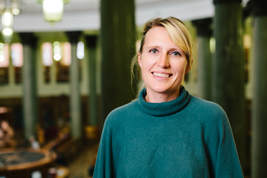
Bee Bond
Bee Bond started teaching EFL in 1996 and worked as a language teacher in Poland, Egypt and Argentina before returning to the UK. She has taught English for Academic Purposes (EAP) at the University of Leeds since 2001, where she is now Associate Professor in EAP. She became interested in Exploratory Practice when she was one of the participants in Judith Hanks’ Doctoral research, and has since worked to include an EP perspective in the curriculum development projects she has undertaken. Her scholarship interests are in teacher development, curriculum development, inclusive learning and teaching in an international context, and content driven EAP.
Bee Bond started teaching EFL in 1996 and worked as a language teacher in Poland, Egypt and Argentina before returning to the UK. She has taught English for Academic Purposes (EAP) at the University of Leeds since 2001, where she is now Associate Professor in EAP. She became interested in Exploratory Practice when she was one of the participants in Judith Hanks’ Doctoral research, and has since worked to include an EP perspective in the curriculum development projects she has undertaken. Her scholarship interests are in teacher development, curriculum development, inclusive learning and teaching in an international context, and content driven EAP.
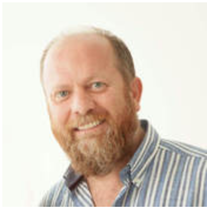
Kenan Dikilitaş
Kenan Dikilitaş works at Bahçeşehir University, Istanbul, where he is Assistant Professor in the ELT department. He has been engaged in establishing teacher research across Turkey and beyond since 2010. To this end he has conducted teacher research projects and held conferences to create opportunities for teachers to share their research. Recently the network has expanded and initiated collaboration with IATEFL ReSIG. This involves not only collaborative conference organisation but also edited publications of teacher research studies.
Kenan Dikilitaş works at Bahçeşehir University, Istanbul, where he is Assistant Professor in the ELT department. He has been engaged in establishing teacher research across Turkey and beyond since 2010. To this end he has conducted teacher research projects and held conferences to create opportunities for teachers to share their research. Recently the network has expanded and initiated collaboration with IATEFL ReSIG. This involves not only collaborative conference organisation but also edited publications of teacher research studies.
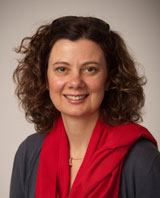
Judith Hanks
Judith Hanks started teaching EFL in 1987 and has worked as a language teacher, teacher educator and manager in China, Italy, Singapore and the UK, where she is now Associate Professor at the School of Education, University of Leeds. She has been centrally involved in Exploratory Practice since 1997, working with colleagues from Brazil, China, Japan and UK to develop a framework of principles for practitioner research for language teachers and learners. This culminated in her book with Dick Allwright: The Developing Language Learner: an introduction to Exploratory Practice (2009), and her most recent book: Exploratory Practice in Language Teaching: Puzzling about principles and practices. (2017). Her research interests lie in the areas of practitioner research, exploratory practice, teacher education, learner/teacher development, and intercultural studies.
Judith Hanks started teaching EFL in 1987 and has worked as a language teacher, teacher educator and manager in China, Italy, Singapore and the UK, where she is now Associate Professor at the School of Education, University of Leeds. She has been centrally involved in Exploratory Practice since 1997, working with colleagues from Brazil, China, Japan and UK to develop a framework of principles for practitioner research for language teachers and learners. This culminated in her book with Dick Allwright: The Developing Language Learner: an introduction to Exploratory Practice (2009), and her most recent book: Exploratory Practice in Language Teaching: Puzzling about principles and practices. (2017). Her research interests lie in the areas of practitioner research, exploratory practice, teacher education, learner/teacher development, and intercultural studies.
Language Teacher Motivation (online discussion: 2nd January - 16th January 2018)
Mark Wyatt and Martin Lamb
In this online discussion, language teacher motivation will be explored through a succession of themes:
1. Happy teaching
2. Reasons for entering the profession
3. Positive and negative experiences of the practicum
4. Stressful school and environmental factors
5. Challenges and frustrations experienced by non-native speaker English teachers
6. Positive and negative experiences of in-service teacher education
7. Connecting with students or not
8. Empowerment through reflection, exploratory practice, action research or not
The input for the discussion will be in the form of quotes from teachers from various parts of the world, quotes that have appeared in various published articles. We are not asking you to read the articles, although, of course if you have access to them, you may; we are inviting you to comment on the quotes and reflect on your own experiences.
We introduce the first theme below. To follow the discussion and participate, you will need to join the Research SIG's Yahoo!Group: https://groups.yahoo.com/neo/groups/resig/info
This is open to members and non-members of the SIG alike. Just click on the link and follow the instructions. It is very easy to join the Yahoo Group and does not cost anything.
Day 1 (2nd January 2018): Happy teaching
If I’m not exaggerating, I was on the floor, rolling and laughing... Something happened in class that was so funny... And the kids were laughing with me, you know? And, and after that... I found... some kind of happiness I never had before. Somehow I connected... I was actually happy doing this, you know? I was playing with the kids. I didn’t feel that I was teaching at all. I was playing, you know... After three more days of happy teaching, if that’s what you want to call it, teaching, I remember I called my mom, and I told her… (Filipino teacher of English working in Taiwan, quoted in Shih, 2016, p. 47).
Reference:
Shih, S-M. (2016). Why do they want to become English teachers: A case study of Taiwanese EFL teachers. Perspectives in Education 34(3), 43-55.
Mark Wyatt has been moderating or facilitating the moderation of IATEFL ReSIG Yahoo Group online discussions since 2014; he also co-edits ELT Research, and has co-edited ReSIG-sponsored volumes of teacher research from Turkey, most recently with Anne Burns, Kenan Dikilitaş and Richard Smith: http://resig.weebly.com/developing-insights-into-teacher-research.html
Martin Lamb teaches on BA and MA courses in TESOL at the University of Leeds. He is a regular speaker at conferences on topics related to motivation and last year he hosted the Hornby Scholars presentation at IATEFL on ‘Teacher Motivation’.
Mark and Martin are both contributors to a new book on language teacher psychology, which is to be published on 31st January 2018: Mercer, S. and Kostoulas, A. (eds.), Language Teacher Psychology. Bristol: Multilingual Matters: http://www.multilingual-matters.com/display.asp?K=9781783099450
With colleagues, Martin has contributed a chapter entitled: 'Language Teacher Motivation: From the Ideal to the Feasible Self'. Mark’s chapter is entitled: 'Language Teachers' Self-efficacy beliefs: An Introduction'.
Mark and Martin are also working on a chapter together for the Routledge Handbook of English Language Teacher Education, which is being edited by Steve Walsh and Steve Mann, and should appear in 2019. Their draft chapter is provisionally entitled: 'Teacher Motivation: The Missing Ingredient in Teacher Education'.
1. Happy teaching
2. Reasons for entering the profession
3. Positive and negative experiences of the practicum
4. Stressful school and environmental factors
5. Challenges and frustrations experienced by non-native speaker English teachers
6. Positive and negative experiences of in-service teacher education
7. Connecting with students or not
8. Empowerment through reflection, exploratory practice, action research or not
The input for the discussion will be in the form of quotes from teachers from various parts of the world, quotes that have appeared in various published articles. We are not asking you to read the articles, although, of course if you have access to them, you may; we are inviting you to comment on the quotes and reflect on your own experiences.
We introduce the first theme below. To follow the discussion and participate, you will need to join the Research SIG's Yahoo!Group: https://groups.yahoo.com/neo/groups/resig/info
This is open to members and non-members of the SIG alike. Just click on the link and follow the instructions. It is very easy to join the Yahoo Group and does not cost anything.
Day 1 (2nd January 2018): Happy teaching
- Read the quote below. Have you ever felt like this? Do you have any experiences of happy teaching you would like to share? How do you explain this kind of happiness?
If I’m not exaggerating, I was on the floor, rolling and laughing... Something happened in class that was so funny... And the kids were laughing with me, you know? And, and after that... I found... some kind of happiness I never had before. Somehow I connected... I was actually happy doing this, you know? I was playing with the kids. I didn’t feel that I was teaching at all. I was playing, you know... After three more days of happy teaching, if that’s what you want to call it, teaching, I remember I called my mom, and I told her… (Filipino teacher of English working in Taiwan, quoted in Shih, 2016, p. 47).
Reference:
Shih, S-M. (2016). Why do they want to become English teachers: A case study of Taiwanese EFL teachers. Perspectives in Education 34(3), 43-55.
Mark Wyatt has been moderating or facilitating the moderation of IATEFL ReSIG Yahoo Group online discussions since 2014; he also co-edits ELT Research, and has co-edited ReSIG-sponsored volumes of teacher research from Turkey, most recently with Anne Burns, Kenan Dikilitaş and Richard Smith: http://resig.weebly.com/developing-insights-into-teacher-research.html
Martin Lamb teaches on BA and MA courses in TESOL at the University of Leeds. He is a regular speaker at conferences on topics related to motivation and last year he hosted the Hornby Scholars presentation at IATEFL on ‘Teacher Motivation’.
Mark and Martin are both contributors to a new book on language teacher psychology, which is to be published on 31st January 2018: Mercer, S. and Kostoulas, A. (eds.), Language Teacher Psychology. Bristol: Multilingual Matters: http://www.multilingual-matters.com/display.asp?K=9781783099450
With colleagues, Martin has contributed a chapter entitled: 'Language Teacher Motivation: From the Ideal to the Feasible Self'. Mark’s chapter is entitled: 'Language Teachers' Self-efficacy beliefs: An Introduction'.
Mark and Martin are also working on a chapter together for the Routledge Handbook of English Language Teacher Education, which is being edited by Steve Walsh and Steve Mann, and should appear in 2019. Their draft chapter is provisionally entitled: 'Teacher Motivation: The Missing Ingredient in Teacher Education'.
2017
Recent reflective practitioner and practitioner research-oriented Editor’s Choice articles in the ELTJ (online discussion: 26th January – 10th February 2017)
Mark Wyatt and Simon Borg
|
Mark Wyatt has been moderating or facilitating the moderation of IATEFL ReSIG Yahoo Group online discussions since 2014; he also co-edits the ReSIG’s newsletter ELT Research, and has co-edited ReSIG-sponsored volumes of teacher research from Turkey. Since gaining his PhD in Education from the University of Leeds in 2008 (which was supervised by Simon Borg), Mark has published widely in international journals. His main research interests relate to teachers’ self-efficacy beliefs, practitioner research and teacher development. Earlier in his career he worked in Thailand, Nepal, Oman (on a BA TESOL project) and the UK (on a B.Ed TESL project with Malaysian teachers). He is currently based in the UAE, supporting the development of research skills through a holistic project-based learning approach.
|
Simon Borg has been involved in language education for 28 years, working as a teacher, teacher educator, lecturer, researcher and consultant in a range of international contexts. Simon is recognized internationally for his work on teacher cognition, professional development and teacher research. After 15 years at the University of Leeds, where he was Professor of TESOL, Simon now works full-time as an ELT Consultant, with a particular focus on designing, facilitating and evaluating language teacher professional development programmes. He also holds Visiting Professor positions at the University of Leeds and Western Norway University of Applied Sciences and is a former co-ordinator of ReSIG. Full details of his work are available at http://simon-borg.co.uk
|
An innovation introduced by the ELTJ in 2012 was to make one article per issue freely available: http://www.oxfordjournals.org/our_journals/eltj/editors_choice.html
These ‘Editor’s Choice’ articles are often accompanied by short videos of authors discussing their work. In the past, we have centred several of our IATEFL ReSIG yahoo group discussions on these open access articles. However, we have not drawn upon this resource in the last two years.
The current discussion focuses on five recent (2015 and 2016) reflective practitioner and practitioner research-oriented Editor’s Choice articles on the topics: reflective practice, exploratory practice, action research and teacher research. The articles are as follows:
Dikilitaş, K. and Mumford, S.E. (2016). Supporting the writing up of teacher research: peer and mentor roles. ELT Journal 70(4), 371-381. http://eltj.oxfordjournals.org/content/70/4/371.full
Edwards, E. and Burns, A. (2016). Language teacher action research: achieving sustainability. ELT Journal 70(1), 6-15. http://eltj.oxfordjournals.org/content/70/1/6.full
Hanks, J. (2015). ‘Education is not just teaching’: learner thoughts on Exploratory Practice. ELT Journal 69(2), 117-128. http://eltj.oxfordjournals.org/content/69/2/117.full
Walsh, S. and Mann, S. (2015). Doing reflective practice: a data-led way forward. ELT Journal 69(4), 351-362. http://eltj.oxfordjournals.org/content/69/4/351.full
Yuan, R. and Lee, I. (2015). Action research facilitated by university-school collaboration. ELT Journal 69(1), 1-10. http://eltj.oxfordjournals.org/content/69/1/1.full
The discussion will be organised around the following 7 themes, with references to the above articles fed in gradually as the discussion progresses. The themes are:
Days 1 and 2: The centrality of reflection (key text: Walsh and Mann, 2015).
Days 3 and 4: Evidence of reflection and tools to support it (key text: Walsh and Mann, 2015).
Day 5: Reflection and growth (key text: Yuan and Lee, 2015).
Days 6 and 7: From reflection to research (key text: Yuan and Lee, 2015).
Days 8-10: Forms of research available to classroom practitioners (key texts: Edwards and Burns, 2016; Hanks, 2015).
Days 11-13: Benefits of Action Research (AR) and Exploratory Practice (EP) (key texts: Edwards and Burns, 2016; Hanks, 2015).
Days: 14-16: Supporting teacher research (key text: Dikilitaş and Mumford, 2016).
So to prepare, it would be a good idea to read Walsh and Mann (2015) first. This will be the focus of the first four days. Yuan and Lee (2015) will be the focus of the next three days. Attention will then shift for the next six days to Edwards and Burns (2016) and Hanks (2015). The final three days of the discussion will centre on Dikilitaş and Mumford (2016).
Questions relating to each theme will be uploaded just prior to discussion of it. An introduction to the first theme is below:
Days 1 and 2: The centrality of reflection
Walsh and Mann (2015, p. 351) quote Dewey (1933, p. 15) as arguing that reflection is the ‘sole method of escape from the purely impulsive or purely routine action’.
They follow Dewey in emphasizing that reflection involves serious, active, and persistent engagement with a doubt or puzzle, and suggest the reflective process can be realized through the use of a systematic, structured approach, involving hypothesis testing.
- On the basis of your experience, do you agree with Walsh, Mann and Dewey about the importance of reflection?
- How have you engaged systematically with reflection in the past?
- If you are a mentor, how have you helped teachers reflect?
2016
Views of ELT History (online discussion: 28 November – 11 December 2016)
Friederike Klippel and Richard Smith
Our autumn 2016 discussion anticipates our Pre-Conference Event at the IATEFL conference in April 2017 in Glasgow, where Richard and Friederike are facilitating the following event: 'Researching ELT History: A Hands-on Workshop'. In the meantime, in this online discussion, Friederike and Richard will be conversing with each other about historical research in ELT and encouraging participation from ReSIG Yahoo Group members.
Introduction
The history of English language learning and teaching is not usually much considered by teachers or researchers. And yet, we all have a personal view or views about the past which may influence our view of the profession. Some feel that our field has progressed steadily over the years and that the present is an improvement on what went before. Others think that things were better in the past, or that so-called 'new' ideas have simply reappeared, recycled.
In some ways, our profession may be governed by 'hearsay', 'myths' or clichés about the past which only historical research can dispel – for example, particular views about how methods have developed, or how much or how little teachers used to use the students' mother tongue or 'communicative activities' in their practice.
In this discussion/debate, two leading scholars in the field of research into the history of ELT will share their perspectives and invite comment on some common perceptions of history as well as on some major findings of historical studies and their relevance to language education.
Some of the propositions to be considered are:
* 'The past has been a steady progression to our current pinnacle of achievement'
* 'Things were better in the old days' ('früher war alles besser' in German)
* 'History has been a series of pendulum shifts'
* 'Everything comes full circle'
* 'There's nothing new under the sun' ('plus ça change, plus ça reste la même chose' in French)'
* 'There is nothing constant but change itself' (Heraclitus)
* 'The past is dry and dusty'
If you are coming to the IATEFL conference in 2017 in Glasgow, you might like to come to the Pre-Conference Event which Richard and Friederike are facilitating on 3 April 2017 called 'Researching ELT History: A Hands-on Workshop'. Further details here: http://resig.weebly.com/iatefl-resig-pce-2017.html
Richard Smith is a Reader in ELT & Applied Linguistics at the University of Warwick, where he teaches and supervises MA and PhD students. He founded the Warwick ELT Archive in 2002 and has published widely in the field of history of language learning and teaching, besides other areas. He was the coordinator of IATEFL Research SIG from 2011 to 2015 and is a founder and co-convenor of the AILA Research Network on History of Language Learning and Teaching (http://hollt.net). His recent articles include ‘Building applied linguistic historiography’ (Applied Linguistics) and, with A.P.R. Howatt, ‘The history of teaching English as a foreign language, from a British and European perspective’ (Language and History). He recently completed a history of IATEFL with Shelagh Rixon (to be published in 2017 to mark IATEFL's 50th anniversary) and he is currently working on a history of the 19th century Reform Movement with Friederike Klippel and Andrew Linn.
Friederike Klippel held the Chair of English Language Education (ELT/TESOL) at Ludwig-Maximilians University in Munich from 1994 to 2015 after her PhD (1979) and her postdoc degree (1992) at Dortmund University (Germany). In the academic year 2016-17 she is guest professor for TEFL at the University of Vienna. She has published on a wide range of aspects concerning English language teaching and language teacher education. Her research areas comprise the history of language teaching and learning, language teaching methodology, classroom research, intercultural education, teacher education and professional development. Her many publications include Keep Talking (CUP) and a comprehensive historical study of learning and teaching English in 18th and 19th century Germany (Englischlernen im 18. und 19. Jahrhundert. Die Geschichte der Lehrbücher und Unterrichtsmethoden. Münster: Nodus, 1994).
Introduction
The history of English language learning and teaching is not usually much considered by teachers or researchers. And yet, we all have a personal view or views about the past which may influence our view of the profession. Some feel that our field has progressed steadily over the years and that the present is an improvement on what went before. Others think that things were better in the past, or that so-called 'new' ideas have simply reappeared, recycled.
In some ways, our profession may be governed by 'hearsay', 'myths' or clichés about the past which only historical research can dispel – for example, particular views about how methods have developed, or how much or how little teachers used to use the students' mother tongue or 'communicative activities' in their practice.
In this discussion/debate, two leading scholars in the field of research into the history of ELT will share their perspectives and invite comment on some common perceptions of history as well as on some major findings of historical studies and their relevance to language education.
Some of the propositions to be considered are:
* 'The past has been a steady progression to our current pinnacle of achievement'
* 'Things were better in the old days' ('früher war alles besser' in German)
* 'History has been a series of pendulum shifts'
* 'Everything comes full circle'
* 'There's nothing new under the sun' ('plus ça change, plus ça reste la même chose' in French)'
* 'There is nothing constant but change itself' (Heraclitus)
* 'The past is dry and dusty'
If you are coming to the IATEFL conference in 2017 in Glasgow, you might like to come to the Pre-Conference Event which Richard and Friederike are facilitating on 3 April 2017 called 'Researching ELT History: A Hands-on Workshop'. Further details here: http://resig.weebly.com/iatefl-resig-pce-2017.html
Richard Smith is a Reader in ELT & Applied Linguistics at the University of Warwick, where he teaches and supervises MA and PhD students. He founded the Warwick ELT Archive in 2002 and has published widely in the field of history of language learning and teaching, besides other areas. He was the coordinator of IATEFL Research SIG from 2011 to 2015 and is a founder and co-convenor of the AILA Research Network on History of Language Learning and Teaching (http://hollt.net). His recent articles include ‘Building applied linguistic historiography’ (Applied Linguistics) and, with A.P.R. Howatt, ‘The history of teaching English as a foreign language, from a British and European perspective’ (Language and History). He recently completed a history of IATEFL with Shelagh Rixon (to be published in 2017 to mark IATEFL's 50th anniversary) and he is currently working on a history of the 19th century Reform Movement with Friederike Klippel and Andrew Linn.
Friederike Klippel held the Chair of English Language Education (ELT/TESOL) at Ludwig-Maximilians University in Munich from 1994 to 2015 after her PhD (1979) and her postdoc degree (1992) at Dortmund University (Germany). In the academic year 2016-17 she is guest professor for TEFL at the University of Vienna. She has published on a wide range of aspects concerning English language teaching and language teacher education. Her research areas comprise the history of language teaching and learning, language teaching methodology, classroom research, intercultural education, teacher education and professional development. Her many publications include Keep Talking (CUP) and a comprehensive historical study of learning and teaching English in 18th and 19th century Germany (Englischlernen im 18. und 19. Jahrhundert. Die Geschichte der Lehrbücher und Unterrichtsmethoden. Münster: Nodus, 1994).
Developing networks to support teacher-research (online discussion: 5-19 June 2016)
This discussion will be a kind of round table, featuring puzzles posed by the participants reflecting on their experiences of supporting teacher-research, and questions from the floor:
The participants are:
Richard Smith
Amol Padwad
Anne Burns
Harry Kuchah Kuchah
Kenan Dikilitaş
Richard Smith (University of Warwick, UK) was the coordinator of IATEFL Research SIG from 2011 to 2015. He has been involved in several recent initiatives connected with teacher-research: leading IATEFL Research SIG’s development of new kinds of forum for sharing teacher-research, including the ‘Teachers Research!’ series of conferences; advising on the Champion Teachers project in Chile; initiating the CAMELTA Teacher Association Research project in Cameroon; and providing initial guidance also for innovative practice with teachers of large classes in Nepal and India. His publications in this field include three recently co-edited Open Access e-books: Teacher-Researchers in Action, Teachers Research! (both published by IATEFL) and Champion Teachers: Stories of Exploratory Action Research (British Council).
Amol Padwad teaches in a college in Maharashtra, India, and is the National Convener, All India Network of English Teachers (AINET). His areas of active interest include teacher networking and CPD. Currently he is leading the AINET Teacher Research Project supported by British Council and IATEFL ReSIG, which is helping about 30 school teachers to carry out individual action research on topics of their choice.
Anne Burns is Professor of TESOL in the School of Education, University of New South Wales, Australia, and Professor Emerita at Aston University, UK. For over 30 years she has worked with teachers in Australia, including in the Australian Government's Adult Migrant English Program, and internationally to support action research in English language classrooms, and has published extensively on this topic. As part of this work she pioneered the idea of English language teachers publishing their research through the Teachers Voices Series (1-8, NCELTR, 1995-2005). Her books, Collaborative action research for English language teachers (CUP, 1999) and Doing action research in English language teaching: A guide for practitioners (Routledge, 2010) have been used by teachers all over the world. Since 2010 she has facilitated the Australian Action Research in ELICOS Program, initiated by English Australia and funded by Cambridge English Language Assessment, and is also currently working with teacher researchers at Monash College, Melbourne, and the Universidad Chileno-Británica de Cultura (UCBC) in Santiago, Chile.
Harry Kuchah Kuchah (University of Bath, UK) worked as an English language teacher, teacher trainer, and policy maker in Cameroon for 14 years before becoming a teaching fellow and later lecturer in the UK. Since 2005, Harry has been involved in the development of two teacher associations in Cameroon. In particular, he served as Secretary General and Chief Convenor and later VP for International Outreach of the Cameroon English Language Teachers’ Association (CAMELTA) for 8 years and is currently a member of the Research Committee of CAMELTA. Since 2008, he has also served on the advisory board of the Central Regional Association of Basic Education Teachers (CEPABETA) in Cameroon. Together with Richard Smith, and working as Outreach Coordinator of IATEFL ReSIG, he has helped develop the Teacher Association research project in Cameroon: http://resig.weebly.com/cameroon.html .
Kenan Dikilitaş works at Bahçeşehir University, İstanbul, in the ELT department. He has been engaged in establishing teacher-research across Turkey and beyond since 2010. To this end, he has conducted teacher research projects and held conferences to create opportunities for teachers to share their research. Recently the network has expanded and initiated collaboration with the IATEFL ReSIG, which still continues. The network involves not only collaborative conference organization but also edited publications of teacher research studies.
Puzzles posed by the participants:
Richard Smith
Here are my questions:
Amol Padwad
Two key questions about research networking have come up in course of the AINET Teacher Research Project.
Anne Burns
A couple of questions that I'd be interested in exploring that I've been thinking about for quite some time in my work (by participants, I mean, those in the discussion):
and if I'm allowed a third!
Harry Kuchah Kuchah
My work has mainly been with teachers in otherwise under-resourced context with no previous training on research and where internet connection is often unavailable making communication with teachers difficult. I will be interested in exploring the following questions.
Kenan Dikilitaş
My questions are as follows:
The participants are:
Richard Smith
Amol Padwad
Anne Burns
Harry Kuchah Kuchah
Kenan Dikilitaş
Richard Smith (University of Warwick, UK) was the coordinator of IATEFL Research SIG from 2011 to 2015. He has been involved in several recent initiatives connected with teacher-research: leading IATEFL Research SIG’s development of new kinds of forum for sharing teacher-research, including the ‘Teachers Research!’ series of conferences; advising on the Champion Teachers project in Chile; initiating the CAMELTA Teacher Association Research project in Cameroon; and providing initial guidance also for innovative practice with teachers of large classes in Nepal and India. His publications in this field include three recently co-edited Open Access e-books: Teacher-Researchers in Action, Teachers Research! (both published by IATEFL) and Champion Teachers: Stories of Exploratory Action Research (British Council).
Amol Padwad teaches in a college in Maharashtra, India, and is the National Convener, All India Network of English Teachers (AINET). His areas of active interest include teacher networking and CPD. Currently he is leading the AINET Teacher Research Project supported by British Council and IATEFL ReSIG, which is helping about 30 school teachers to carry out individual action research on topics of their choice.
Anne Burns is Professor of TESOL in the School of Education, University of New South Wales, Australia, and Professor Emerita at Aston University, UK. For over 30 years she has worked with teachers in Australia, including in the Australian Government's Adult Migrant English Program, and internationally to support action research in English language classrooms, and has published extensively on this topic. As part of this work she pioneered the idea of English language teachers publishing their research through the Teachers Voices Series (1-8, NCELTR, 1995-2005). Her books, Collaborative action research for English language teachers (CUP, 1999) and Doing action research in English language teaching: A guide for practitioners (Routledge, 2010) have been used by teachers all over the world. Since 2010 she has facilitated the Australian Action Research in ELICOS Program, initiated by English Australia and funded by Cambridge English Language Assessment, and is also currently working with teacher researchers at Monash College, Melbourne, and the Universidad Chileno-Británica de Cultura (UCBC) in Santiago, Chile.
Harry Kuchah Kuchah (University of Bath, UK) worked as an English language teacher, teacher trainer, and policy maker in Cameroon for 14 years before becoming a teaching fellow and later lecturer in the UK. Since 2005, Harry has been involved in the development of two teacher associations in Cameroon. In particular, he served as Secretary General and Chief Convenor and later VP for International Outreach of the Cameroon English Language Teachers’ Association (CAMELTA) for 8 years and is currently a member of the Research Committee of CAMELTA. Since 2008, he has also served on the advisory board of the Central Regional Association of Basic Education Teachers (CEPABETA) in Cameroon. Together with Richard Smith, and working as Outreach Coordinator of IATEFL ReSIG, he has helped develop the Teacher Association research project in Cameroon: http://resig.weebly.com/cameroon.html .
Kenan Dikilitaş works at Bahçeşehir University, İstanbul, in the ELT department. He has been engaged in establishing teacher-research across Turkey and beyond since 2010. To this end, he has conducted teacher research projects and held conferences to create opportunities for teachers to share their research. Recently the network has expanded and initiated collaboration with the IATEFL ReSIG, which still continues. The network involves not only collaborative conference organization but also edited publications of teacher research studies.
Puzzles posed by the participants:
Richard Smith
Here are my questions:
- What are teacher-research networks, what are they for, and why are we interested in them? (sorry, three questions!)
- How can teacher-research networks and other self-sustaining groups be developed effectively (with what kinds of leadership, mentoring and letting go)? What lessons can we take from our experiences, good and bad?
Amol Padwad
Two key questions about research networking have come up in course of the AINET Teacher Research Project.
- Given that the project participants rated face-to-face meetings as absolutely essential and crucial in their work, how and how far should research networks invest in face-to-face meetings?
- How far do research networks depend on the presence of mentors or ‘senior counsellors’ for effectiveness and for sustainability?
Anne Burns
A couple of questions that I'd be interested in exploring that I've been thinking about for quite some time in my work (by participants, I mean, those in the discussion):
- What have participants found to be key features of networks that are effective in supporting practitioner researchers?
- What new forms of networking (beyond face-to-face) have participants experimented with and what are the advantages/disadvantages?
and if I'm allowed a third!
- What can be done to maintain networks among teachers who have been part of a practitioner research program into the future?
Harry Kuchah Kuchah
My work has mainly been with teachers in otherwise under-resourced context with no previous training on research and where internet connection is often unavailable making communication with teachers difficult. I will be interested in exploring the following questions.
- What discourses and strategies might motivate teachers - who are often grappling with challenges such as large under-resourced classrooms, constant changes in language teaching policies, high stakes exams, etc – to engage in any form of classroom research?
- How might it be possible to continue to sustain teachers’ motivation in developing collective research (e.g., the CAMELTA TA research project) where ongoing virtual discussion and sharing is not possible?
Kenan Dikilitaş
My questions are as follows:
- How can these networks promote meaningful teacher development in specific ways?
- Turkey is a developing country which still needs to progress particularly in the education of teachers and learners of English. How do such networks function as a catalyst that contribute to the quality and pace of development in such countries?
21st March – 4th April 2016: Discussion of the qualitative interview
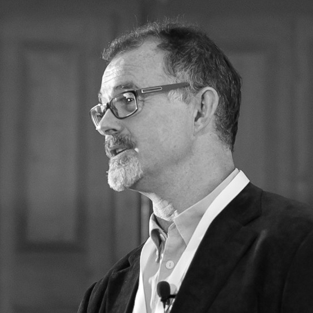
Our spring 2016 discussion focuses on the qualitative interview. The moderator is Steve Mann, who in April will be leading the ReSIG's PCE in Birmingham.
Some biographical information about Steve is below, together with a recent photo. He has supplied a message of welcome and an opening question, with references.
Steve Mann (Associate Professor) currently works at the Centre for Applied Linguistics at University of Warwick. He previously lectured at both Aston University and University of Birmingham. He has experience in Hong Kong, Japan and Europe in both English language teaching and teacher development. Steve supervisors a research group of PhD students who are investigating teacher's education and development. The group’s work considers aspects of teacher development, teacher beliefs and the development of knowledge, the first year of teaching, reflective practice, mentoring, blended learning, and the use of technology in teacher development. He has published various books including Innovations in Pre-service Teacher Education (British Council). His most recent book is titled The Research Interview: Reflexivity and Reflective Practice in Research Processes (Palgrave).
Author email: [email protected]
Dear everyone,
Thank you to the IATEFL Research Sig for giving us the opportunity to begin a discussion of the nature of the qualitative interview. Over the next two weeks, please feel free to post your ideas and questions. Those of you attending the IATEFL ReSIG Pre-Conference Event (Conversations with a purpose: Reflecting on interviewing in EFL research) will have a chance to talk about these issues face to face in Birmingham.
To start the discussion, let’s start with a general but important question:
What does reflexivity mean to you as a researcher?
This is a difficult concept to pin down, even though it is worth trying. Macbeth puts it like this:
The program’s consensus is not easily described, and the play of reflexivity in the literature is far more diverse than single, or several, positions can account for. And although this diversity assures us that any account of it can only be tendentious, it may still be useful to try to build one (2001: 35).
Watt shares her experience of this fuzzyness and lack of explicit form: ‘Although convincing on a theoretical level, as a new researcher I had little idea what this meant in concrete terms (Watt 2007: 82).
So, let’s try and build a joint definition for reflexivity! Over to you ….
Steve
p.s. there are plenty of useful free resources about interviewing at this website.
References:
Macbeth, D. (2001). On “reflexivity” in qualitative research: Two readings and a third. Qualitative Inquiry, 7(1), 35-68.
Watt, D. (2007). On Becoming a Qualitative Researcher: The Value of Reflexivity. Qualitative Report, 12(1), 82-101.
Some biographical information about Steve is below, together with a recent photo. He has supplied a message of welcome and an opening question, with references.
Steve Mann (Associate Professor) currently works at the Centre for Applied Linguistics at University of Warwick. He previously lectured at both Aston University and University of Birmingham. He has experience in Hong Kong, Japan and Europe in both English language teaching and teacher development. Steve supervisors a research group of PhD students who are investigating teacher's education and development. The group’s work considers aspects of teacher development, teacher beliefs and the development of knowledge, the first year of teaching, reflective practice, mentoring, blended learning, and the use of technology in teacher development. He has published various books including Innovations in Pre-service Teacher Education (British Council). His most recent book is titled The Research Interview: Reflexivity and Reflective Practice in Research Processes (Palgrave).
Author email: [email protected]
Dear everyone,
Thank you to the IATEFL Research Sig for giving us the opportunity to begin a discussion of the nature of the qualitative interview. Over the next two weeks, please feel free to post your ideas and questions. Those of you attending the IATEFL ReSIG Pre-Conference Event (Conversations with a purpose: Reflecting on interviewing in EFL research) will have a chance to talk about these issues face to face in Birmingham.
To start the discussion, let’s start with a general but important question:
What does reflexivity mean to you as a researcher?
This is a difficult concept to pin down, even though it is worth trying. Macbeth puts it like this:
The program’s consensus is not easily described, and the play of reflexivity in the literature is far more diverse than single, or several, positions can account for. And although this diversity assures us that any account of it can only be tendentious, it may still be useful to try to build one (2001: 35).
Watt shares her experience of this fuzzyness and lack of explicit form: ‘Although convincing on a theoretical level, as a new researcher I had little idea what this meant in concrete terms (Watt 2007: 82).
So, let’s try and build a joint definition for reflexivity! Over to you ….
Steve
p.s. there are plenty of useful free resources about interviewing at this website.
References:
Macbeth, D. (2001). On “reflexivity” in qualitative research: Two readings and a third. Qualitative Inquiry, 7(1), 35-68.
Watt, D. (2007). On Becoming a Qualitative Researcher: The Value of Reflexivity. Qualitative Report, 12(1), 82-101.
10th February – 24th February 2016: Discussion of articles on teacher-research in Latin America
Moderated by Darío Luis Banegas (Argentina), Inés Miller (Brazil) and Paula Rebolledo (Chile).
Our February 2016 discussion showcases some very interesting developments in practitioner research currently taking place in South America. It is running just prior to the first annual Latin American conference on teacher research, which is being held in Santiago, Chile. This conference is being organized by the British Council Chile and RICELT. There are details here: http://resig.weebly.com/teachers-research-chile-2016.html
The moderators will be South American, representing three different countries in the region, but united by a commitment to support practitioner research: Darío Luis Banegas (Argentina), Inés Miller (Brazil) and Paula Rebolledo (Chile). Biographical details and photos are below:
Darío Luis Banegas, who holds a PhD from the University of Warwick, is a teacher educator and curriculum developer with the Ministerio de Educación del Chubut in Argentina. He coordinates an initial English language teacher education programme in Esquel. He is the president of APIZALS (a TA in Argentina) and the editor of the Argentinian Journal of Applied Linguistics. His main interests are: pre-service teacher education, CLIL, and action research.
Inés K. Miller is Associate Professor at the Pontifical Catholic University of Rio de Janeiro (PUC-Rio), Brazil. She is involved in English language teaching as well as teacher education and development at undergraduate and post-graduate levels. Her research interests focus on the discourse of professional reflection generated by teachers, teacher educators and consultants. As a core member of the Lancaster University-based Exploratory Practice Centre (EPCentre) and mentor of the Rio de Janeiro Exploratory Practice Group, she has also been actively engaged in the development and dissemination of Exploratory Practice - a way of encouraging teachers and learners to engage in practitioner research. She has presented papers at national and international conferences and published widely. In 2006, she co-edited, with Simon Gieve, the book Understanding the language classroom, published by Palgrave Macmillan.
Dr Paula Rebolledo holds an MA in TESOL for Young Learners and a PhD in Education from the University of Leeds. She has taught at school level and in INSETT programmes. Currently Paula is the national academic coordinator of the English Open Doors Programme (EODP) at the Ministry of Education in Chile. Her research interests include young learners, teacher education, professional development and teacher-research. She is the co-founder of RICELT, the first Chilean network of researchers in ELT. She has been mentoring teacher-research on the Champion Teachers project and the APTIS Action Research Award Scheme funded by the British Council.
The articles that will be the focus of the discussion are all available online; just follow the links. (Many thanks to the production editors at Taylor & Francis for making Dario’s article open access for the duration of the discussion.) The articles are:
Miller, I.K., Côrtes, T.C.R., Oliveira, A.F.A., & Braga, W.G. (2015). Exploratory practice in initial teacher education: Working collaboratively for understandings. In D. Bullock & R. Smith (Eds.), Teachers research! (pp. 65-71). Canterbury: IATEFL.
Banegas, D., Pavese, A., Velázquez, A., & María Vélez, S. (2013). Teacher professional development through collaborative action research: Impact on foreign English language teaching and learning. Educational Action Research, 21:2, 185-201. http://dx.doi.org/10.1080/09650792.2013.789717
Smith, R., Connelly, T., & Rebolledo, P. (2014). Teacher research as continuing professional development: A project with Chilean secondary school teachers. In D. Hayes (Ed.), Innovations in the continuing professional development of English language teachers (pp. 111-129). London: British Council.
The discussion will focus on each of these articles in turn, with a different moderator at each stage being chiefly responsible for fielding questions (though others might chip in at any time).
10-14 February 2016 – Moderator: Darío Luis Banegas
Our first article is:
Miller, I.K., Côrtes, T.C.R., Oliveira, A.F.A., & Braga, W.G. (2015). Exploratory practice in initial teacher education: Working collaboratively for understandings. In D. Bullock & R. Smith (Eds.), Teachers research! (pp. 65-71). Canterbury: IATEFL.
If you have any questions about the article, please ask us. Just send us an email. We will be happy to reply. Our questions for you are below:
15-18 February 2016 – Moderator: Paula Rebolledo
Our second article is:
Banegas, D., Pavese, A., Velázquez, A., & María Vélez, S. (2013). Teacher professional development through collaborative action research: Impact on foreign English language teaching and learning. Educational Action Research, 21:2, 185-201. http://dx.doi.org/10.1080/09650792.2013.789717
If you have any questions about the article, please ask us. Just send us an email. We will be happy to reply. Our questions for you are below:
19-22 February 2016 – Moderator: Inés K. Miller
Our third article is:
Smith, R., Connelly, T., & Rebolledo, P. (2014). Teacher research as continuing professional development: A project with Chilean secondary school teachers. In D. Hayes (Ed.), Innovations in the continuing professional development of English language teachers (pp. 111-129). London: British Council.
If you have any questions about the article, please ask us. Just send us an email. We will be happy to reply. Our questions for you are below:
23-24 February 2016 – all moderators sharing
SUGGESTED QUESTIONS FOR CONNECTING THE THREE TEXTS but please come up with your own!
Our February 2016 discussion showcases some very interesting developments in practitioner research currently taking place in South America. It is running just prior to the first annual Latin American conference on teacher research, which is being held in Santiago, Chile. This conference is being organized by the British Council Chile and RICELT. There are details here: http://resig.weebly.com/teachers-research-chile-2016.html
The moderators will be South American, representing three different countries in the region, but united by a commitment to support practitioner research: Darío Luis Banegas (Argentina), Inés Miller (Brazil) and Paula Rebolledo (Chile). Biographical details and photos are below:
Darío Luis Banegas, who holds a PhD from the University of Warwick, is a teacher educator and curriculum developer with the Ministerio de Educación del Chubut in Argentina. He coordinates an initial English language teacher education programme in Esquel. He is the president of APIZALS (a TA in Argentina) and the editor of the Argentinian Journal of Applied Linguistics. His main interests are: pre-service teacher education, CLIL, and action research.
Inés K. Miller is Associate Professor at the Pontifical Catholic University of Rio de Janeiro (PUC-Rio), Brazil. She is involved in English language teaching as well as teacher education and development at undergraduate and post-graduate levels. Her research interests focus on the discourse of professional reflection generated by teachers, teacher educators and consultants. As a core member of the Lancaster University-based Exploratory Practice Centre (EPCentre) and mentor of the Rio de Janeiro Exploratory Practice Group, she has also been actively engaged in the development and dissemination of Exploratory Practice - a way of encouraging teachers and learners to engage in practitioner research. She has presented papers at national and international conferences and published widely. In 2006, she co-edited, with Simon Gieve, the book Understanding the language classroom, published by Palgrave Macmillan.
Dr Paula Rebolledo holds an MA in TESOL for Young Learners and a PhD in Education from the University of Leeds. She has taught at school level and in INSETT programmes. Currently Paula is the national academic coordinator of the English Open Doors Programme (EODP) at the Ministry of Education in Chile. Her research interests include young learners, teacher education, professional development and teacher-research. She is the co-founder of RICELT, the first Chilean network of researchers in ELT. She has been mentoring teacher-research on the Champion Teachers project and the APTIS Action Research Award Scheme funded by the British Council.
The articles that will be the focus of the discussion are all available online; just follow the links. (Many thanks to the production editors at Taylor & Francis for making Dario’s article open access for the duration of the discussion.) The articles are:
Miller, I.K., Côrtes, T.C.R., Oliveira, A.F.A., & Braga, W.G. (2015). Exploratory practice in initial teacher education: Working collaboratively for understandings. In D. Bullock & R. Smith (Eds.), Teachers research! (pp. 65-71). Canterbury: IATEFL.
Banegas, D., Pavese, A., Velázquez, A., & María Vélez, S. (2013). Teacher professional development through collaborative action research: Impact on foreign English language teaching and learning. Educational Action Research, 21:2, 185-201. http://dx.doi.org/10.1080/09650792.2013.789717
Smith, R., Connelly, T., & Rebolledo, P. (2014). Teacher research as continuing professional development: A project with Chilean secondary school teachers. In D. Hayes (Ed.), Innovations in the continuing professional development of English language teachers (pp. 111-129). London: British Council.
The discussion will focus on each of these articles in turn, with a different moderator at each stage being chiefly responsible for fielding questions (though others might chip in at any time).
10-14 February 2016 – Moderator: Darío Luis Banegas
Our first article is:
Miller, I.K., Côrtes, T.C.R., Oliveira, A.F.A., & Braga, W.G. (2015). Exploratory practice in initial teacher education: Working collaboratively for understandings. In D. Bullock & R. Smith (Eds.), Teachers research! (pp. 65-71). Canterbury: IATEFL.
If you have any questions about the article, please ask us. Just send us an email. We will be happy to reply. Our questions for you are below:
- Reflecting on the article and your own experience, what are some advantages of including students in the ‘work for understanding’? What about the challenges?
- What are the opportunities we can find when we work collaboratively with colleagues and learners?
- How important do you think this experience was for Ana Flora and Thelma as future teachers?
- What do you think can be gained by avoiding ‘solving the problem’ but ‘understanding the puzzle’ instead?
- How closer do you think these teachers came to promoting ‘quality of classroom life’?
- How could we use this article to encourage exploratory practice in our professional contexts?
15-18 February 2016 – Moderator: Paula Rebolledo
Our second article is:
Banegas, D., Pavese, A., Velázquez, A., & María Vélez, S. (2013). Teacher professional development through collaborative action research: Impact on foreign English language teaching and learning. Educational Action Research, 21:2, 185-201. http://dx.doi.org/10.1080/09650792.2013.789717
If you have any questions about the article, please ask us. Just send us an email. We will be happy to reply. Our questions for you are below:
- In this text, the co-authors take a systematic reflexive stance about their research process and understandings. Have you ever tried to do this in your writing? Would this work for you in your contexts?
- Banegas et al. refer to topic negotiation achieved between students and teachers (p. 189). How or why do you think they found the ‘freedom’ to do it?
- How do you relate to Banegas et al’s interpretation that teacher identities get recognized when they reflect?
19-22 February 2016 – Moderator: Inés K. Miller
Our third article is:
Smith, R., Connelly, T., & Rebolledo, P. (2014). Teacher research as continuing professional development: A project with Chilean secondary school teachers. In D. Hayes (Ed.), Innovations in the continuing professional development of English language teachers (pp. 111-129). London: British Council.
If you have any questions about the article, please ask us. Just send us an email. We will be happy to reply. Our questions for you are below:
- What does the authors’ decision to create the term ‘Exploratory Action Research’ suggest? How important does this seem to have been for the teachers and the mentors?
- How does the discussion of the relatively large-scale Chilean project relate to your experience around the world? How does/did size matter in your experience?
- How do you view the informal approach adopted to release the tensions about teachers’ oral and written presentations?
23-24 February 2016 – all moderators sharing
SUGGESTED QUESTIONS FOR CONNECTING THE THREE TEXTS but please come up with your own!
- Based on your understanding of the three texts, we invite you to consider how the term ‘exploratory’ is being used in each one. What could this suggest?
- Please elaborate on the inclusion of students in the work proposed by EP (Miller et al.), CAR-CLIL (Banegas et al.), and EAR (Smith et al.). Could you highlight any interesting points about their involvement?
- The issue of the language used (either L1 or L2) for reflection comes up in two articles. What do you consider to be most important – ‘fluent’ reflection or ‘fluent’ language use? How does this relate to your experience and your contexts?
- The three articles describe somewhat different gains for teachers’ professional development. What would be more relevant in the sort of benefits achieved through TR; the approach used or context? Can you identify other factors?
2015
28th September – 11th October 2015: Cambodian teachers' responses to child-centered instructional policies: A mismatch between beliefs and practices
|
Our autumn 2015 discussion focuses on an article that recently appeared in the journal ‘Teaching and Teacher Education’ (TATE): Song, S. (2015). Cambodian teachers' responses to child-centered instructional policies: A mismatch between beliefs and practices. Teaching and Teacher Education, 50, 36-45. http://dx.doi.org/10.1016/j.tate.2015.04.004
Very kindly, the production editor of TATE has made the article freely downloadable to RESIG members for the duration of the discussion, via the following link: http://www.sciencedirect.com/science/article/pii/S0742051X15000761 The discussion moderator is Alan Waters. Until recently, Alan was a Senior Lecturer and Director of Studies of the MA TESOL and MA TEFL programmes in the Department of Linguistics and English Language at Lancaster University, England. He has taught EFL in Sierra Leone, Kuwait, and the UK, and trained teachers in Thailand, the UK, Hong Kong, and several other parts of the world. He has published a number of books and papers on a range of ELT topics (his latest article is available free of charge, until October 3, at http://authors.elsevier.com/a/1RXZf_,oOjn9jH [N.B. this is an updated link - sorry the previous one didn’t work properly]). His main ELT interests are language teaching methodology and materials, managing innovation, teacher learning, and the discourse of applied linguistics for language teaching. Email: [email protected] Days 1 – 4 [please note that three questions have been provided together here, so that you can select the one(s) that interest(s) you most, but if you would like to address all of them, please feel free to also do so!] Introduction Q1 To what extent do you agree that the spread of ‘child-centered’ pedagogy to parts of the world such as Cambodia has stemmed from globalization and the human rights movement? Q2 Do you feel it is true, as the author claims (p. 37), that ‘relatively few studies investigate how learner-centered education policy works out in classrooms’? Section 2 (Fig. 1, p. 38). Q3 To what extent does the educational reform process used in Cambodia (a ‘cascade model’) resemble what you are familiar with in other situations? How effective/appropriate do you think it is? Days 5 - 7 [please note that two questions have been provided here so that you can select the one that interests you most, though if you would like to address both of them, please feel free to do so, of course] Section 3 Q4 Is it also your experience that ‘street-level bureaucrats’, especially teachers, rarely adopt new pedagogical practices wholesale, vs. adapt them ‘in the light of inherited knowledge, belief and practice’? Q5 Do the processes involved in the ‘zone of enactment’ and the ‘zone of feasible innovation’ (p. 39, left-hand column) ring any bells for you? In particular, how true do you feel it is that ‘innovation is most likely to take place when it proceeds just ahead of existing practice’ (Rogan and Grayson, 2003)? Days 8 – 10 [please note that two questions have once again been provided here so that you can select the one that interests you most, though if you would like to address both of them, please feel free to do so, of course] Section 4 Q6 What do you think of the research design? For example, how adequate do you feel each of the two questionnaires were? How about the interviews (construction, administration and analysis)? How significant is the lack of data based on direct classroom observation? Section 5.2 Q8 Do you feel that the researcher’s distinction between ‘conventional’ and ‘reform’ activities is always sufficiently clear-cut? Also, do you feel it was clear enough for the teachers themselves? Days 11 – 14 [please note that several questions have once again been provided together here, so that you can select the one(s) that interest(s) you most, but if you would like to address all of them, please feel free to do so!] Section 6.2 Q9 How accurate do you feel the author’s explanation for the policy vs. practice mismatch is? Do you feel any other important factors were likely to have been involved? Section 6.3 Q10 How true do you feel it is that ‘Policies to reform pedagogy are often made to change teachers' teaching skills and, particularly in developing countries, often not accompanied by measures to improve their teaching environment that hinders implementation of new pedagogies’ (p. 43, bottom of left-hand column)? Section 7 Q11 Do you feel the conclusions drawn here are all sound? For example, has sufficient evidence been provided to support the view that ‘teachers take up the reform only at face value without critically examining its meanings’? Also, what do you think of the author’s view that ‘teachers exert considerable influence on instructional policies’ and that ‘many educational innovations fail because they ignore this important fact’? And what do you think of the remedies proposed in the last few sentences – how feasible are they? Q12 - extra overall question (time permitting) Do you think that a fully child-centered pedagogy – if feasible – would actually be more successful? Or is it the case that ‘conventional’ pedagogy has its own educational value? |
25 May – 7 June 2015: Article discussion - Supporting teacher research & encouraging exploratory practice
|
Ahead of the IATEFL ReSIG’s Annual International Conference (to be held in Izmir, Turkey on 18-19 June http://resig.weebly.com/teachers-research-18-19-june-2015.html), our fothcoming discussion is on the following theme:
Supporting teacher research & encouraging exploratory practice We discuss two short articles that have appeared in ELT Research (the IATEFL ReSIG newsletter) in recent years. These are: a) ‘Supporting teacher research: the work of Kenan Dikilitaş and teachers at Gediz University, Izmir’, by Richard Smith http://resig.weebly.com/uploads/2/6/3/6/26368747/smith_2014.pdf b) ‘Exploratory practice: Investigating my own classroom pedagogy’, by Yasmin Dar http://resig.weebly.com/uploads/8/1/4/0/8140071/practitioner_research.pdf The moderators of this discussion will be Anne Burns, Judith Hanks and Mark Wyatt, who are also the plenary speakers at the ReSIG’s conference in Turkey in June 2015: http://resig.weebly.com/teachers-research-18-19-june-2015.html Read more about the moderators here: http://resig.weebly.com/plenary-speakers.html Our preliminary questions (to be developed further) are as follows: 1. Turning to our first article (‘Supporting teacher research: the work of Kenan Dikilitaş and teachers at Gediz University, Izmir’), in his opening paragraph, Richard Smith reports his view “that teacher-research is valuable and viable as a means for in-service professional development, despite the difficulties involved” (2014, p. 16). Our first questions are as follows: Reflecting on your own experience: What evidence do you have that teacher-research is valuable and viable? What difficulties have you encountered? How have you overcome those difficulties? 2. Looking at Kenan’s approach to encouraging teacher-research (as outlined in the article), what do you consider most commendable about it? Would the strategies he adopted work in your context? If your context is quite different, is there anything you could take from his approach to apply in your context? 3. Focusing on specific aspects of the approach, one interesting feature is that the teacher-researchers had opportunities to present and publish their work. How important is it to create such opportunities? Can you think of other teacher-research initiatives in other parts of the world that have adopted this strategy? How might one go about it? 4. Turning to our second article (‘Exploratory practice: Investigating my own classroom pedagogy’), what do you consider most commendable about it? Would the strategies Yasmin Dar (2012) adopted work in your context? If your context is quite different, is there anything you could take from her approach to apply in your context? 5. In this article, Yasmin reports on a study she conducted with her learners focused on a ‘puzzle’. Why does she prefer the word ‘puzzle’ to ‘issue’ or ‘problem’? How important is this word choice? 6. Linking her puzzle to the first principle of Exploratory Practice (EP) (‘Focus on quality of life as the main issue’), Dar (2012) poses the question: “Why don’t my students take greater responsibility for their learning outside class?” (p. 9). What other things puzzle teachers and learners? 7. Yasmin used ‘normal’ classroom activities as tools for her investigation (a central principle of EP). Why was it important she did this? What other normal activities could be used in this way? 8. What understandings did she glean from the students’ responses and why does this matter? How did adopting an exploratory practice approach provide her with insights that she might otherwise not have gained through alternative research methodology? How did the learners benefit from taking part in the research? How important is this? 9. If teachers in diverse contexts are to engage with exploratory practice, what forms of support do they need? References: Dar, Y. (2012). Exploratory practice: Investigating my own classroom pedagogy. ELT Research, 26, 8-10. Smith, R. (2014). Supporting teacher research: the work of Kenan Dikilitaş and teachers at Gediz University, Izmir. ELT Research, 29, 14-16. |
16 – 30 March: Article discussion: Learning to become users of English as a Lingua Franca (ELF): How ELF online communication affects Taiwanese learners' beliefs of English. System, 46, 28-38.
|
Dates: 16 - 30 March
Article: Learning to become users of English as a Lingua Franca (ELF): How ELF online communication affects Taiwanese learners' beliefs of English. Written by I-Chung Ke and Hilda Cahyani. Moderators: Mario Saraceni, Robin Walker, Peter Watkins and Mark Wyatt The discussion will take place in the Research SIG's Yahoo!Group, which is open to members and non-members of the SIG alike. The open access article, with accompanying audio-slides, is available at: http://www.sciencedirect.com/science/article/pii/S0346251X14001092 Article abstract In most online intercultural exchange activities involving English learning, students and classes in English-speaking countries serve as partners to English learners in expanding circle countries. Most studies on such exchanges focus on participants' learning in language and/or culture. This study investigates something different: How do NNS-NNS/ELF (English as a lingua franca) online communication activities affect learners' belief of English, including their ideas of and attitude toward English native speakers, the cultures behind English language, and their identity and relationship with English. 58 Taiwanese students and 48 Indonesian students participated in the two-semester project using English as a lingua franca. Data includes questionnaires conducted before and after the experiences, students' correspondence records, messages they left in the online exchange forums, students' reflections after each semester, and students' retrospective interviews after the experience. Results indicate that although most students' beliefs about English remain consistent with the traditional NS-based ELT paradigm, students cared less about grammar after using English as a lingua franca in their written communication. Students gained confidence and started to perceive English as a language they may be able to use. Pedagogical implications and suggestions are also discussed. About the moderators Mario Saraceni is Course Leader for the BA English Language at the University of Portsmouth. His publications include: World Englishes: A critical analysis (Bloomsbury, 2015) and The re-location of English: shifting paradigms in a global era (Palgrave, 2010). http://www.port.ac.uk/school-of-languages-and-area-studies/staff/dr-mario-saraceni.html Robin Walker, a freelance teacher, teacher educator, and materials writer based in Spain, is outgoing editor of Speak Out!, the IATEFL Pronunciation SIG newsletter. His publications include: Teaching the pronunciation of English as a lingua franca, a 2010 title in the OUP Handbooks for Language Teachers series. https://englishglobalcom.wordpress.com/about-egc/ Peter Watkins is Course Leader for the MA in Applied Linguistics and TESOL at the University of Portsmouth. His publications include: Learning to teach English (Delta Publishing, 2014 – second edition) and (with Scott Thornbury) The CELTA Course (Cambridge, 2007). http://www.port.ac.uk/school-of-languages-and-area-studies/staff/dr-peter-watkins.html Mark Wyatt, who also teaches at Portsmouth, is the IATEFL Research SIG Discussion Board Moderator and has just become co-editor of the SIG’s newsletter: ELT Research. His publications include articles in ELT Journal, Language Teaching Research and System. http://www.port.ac.uk/school-of-languages-and-area-studies/staff/dr-mark-wyatt.html Focusing questions Days 1-2 1. The authors cite Csizér and Kontra’s (2012) quantitative study of 239 Hungarian students that found the views of these students on English “corresponded mostly with the assumptions in the traditional ELT paradigm” (p. 30). To what extent might learners' over-simplified perceptions of their ideal target be the result of the way ‘English’ is presented to them at school/university quite explicitly as a British/American cultural artefact? Days 3-4 2. The authors quote Sharifian (2009, p. 4) as follows: “Most studies of intercultural communication in English have, up until now, focused on NS-NNS intercultural communication”. Why is this? 3. The study focuses on the extent to which non-native university students in Taiwan changed their conceptions of the roles of English after participating in NNS-NNS online communication for two semesters. Why is NNS-NNS communication treated as somewhat special and requiring specific skills in this article? Days 5-6 4. The authors report: “After-project questionnaires indicated that students' answers showed significant changes in three statements; paired t-tests point out that after the project students accepted local accents more" (p. 32). Given that the communications were 'via email twice a week', how might this change in attitude to local accents have come about? Days 7-8 5. A key finding is as follows: "These students realized that to communicate with NNS foreigners, correct grammar may not matter" (p. 33). To what extent is this observation limited to communication with NNSs? Days 9-10 6. The authors report: “The majority of the participants did not see English as connected to their local identity. Most still hoped to be able to speak like an NS… perhaps from the intention to be hospitable” (p. 34). How does this finding relate to research on L2 orientations in different contexts? 7. One of the interviewees reported: “If you speak fluent NS accent, people believe you have a good overall command of English and they won't care about your true proficiency level, so I want to speak NS accent” (p. 34). To what extent do you think this is true? Days 11-12 8. The authors conclude: "We propose an approach that makes compromises... When teaching English language we still adopt NS norms in language forms, but when helping students to apply their linguistic repertoire in language use we take the ELF approach" (p. 36). Do you feel that this is a workable compromise? Could it benefit your own learners? What does it mean in practice do you think? Days 13-14 9. Are there implications from this article for the design of materials? For example, what should ELF pronunciation materials look like? |
